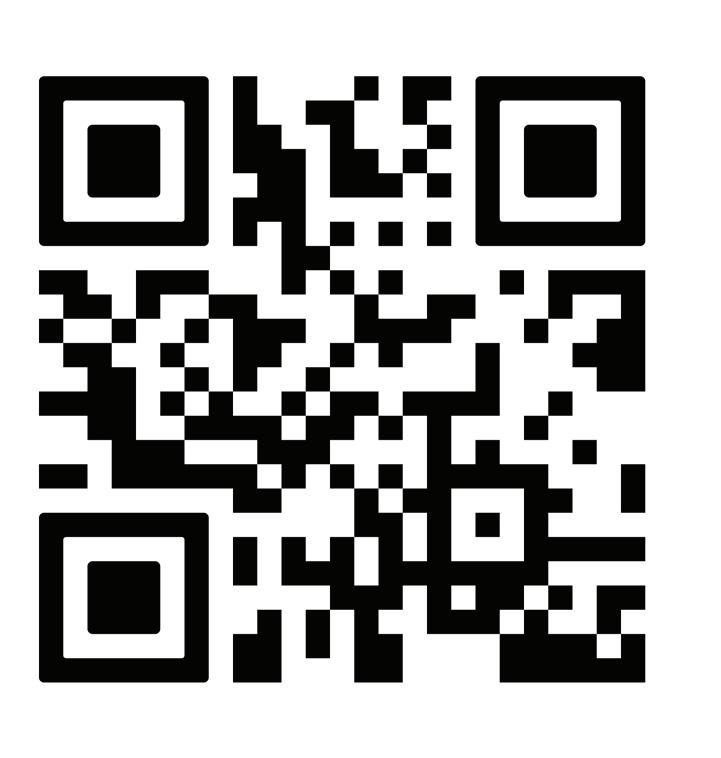





EDITOR-IN-CHIEF
Tyler Sprague
LEAD DESIGNERS


Leslie Arango
Lily Ferguson
DIRECTOR OF STUDENT MEDIA
Sarah Scarborough
ASSISTANT DIRECTOR OF STUDENT MEDIA
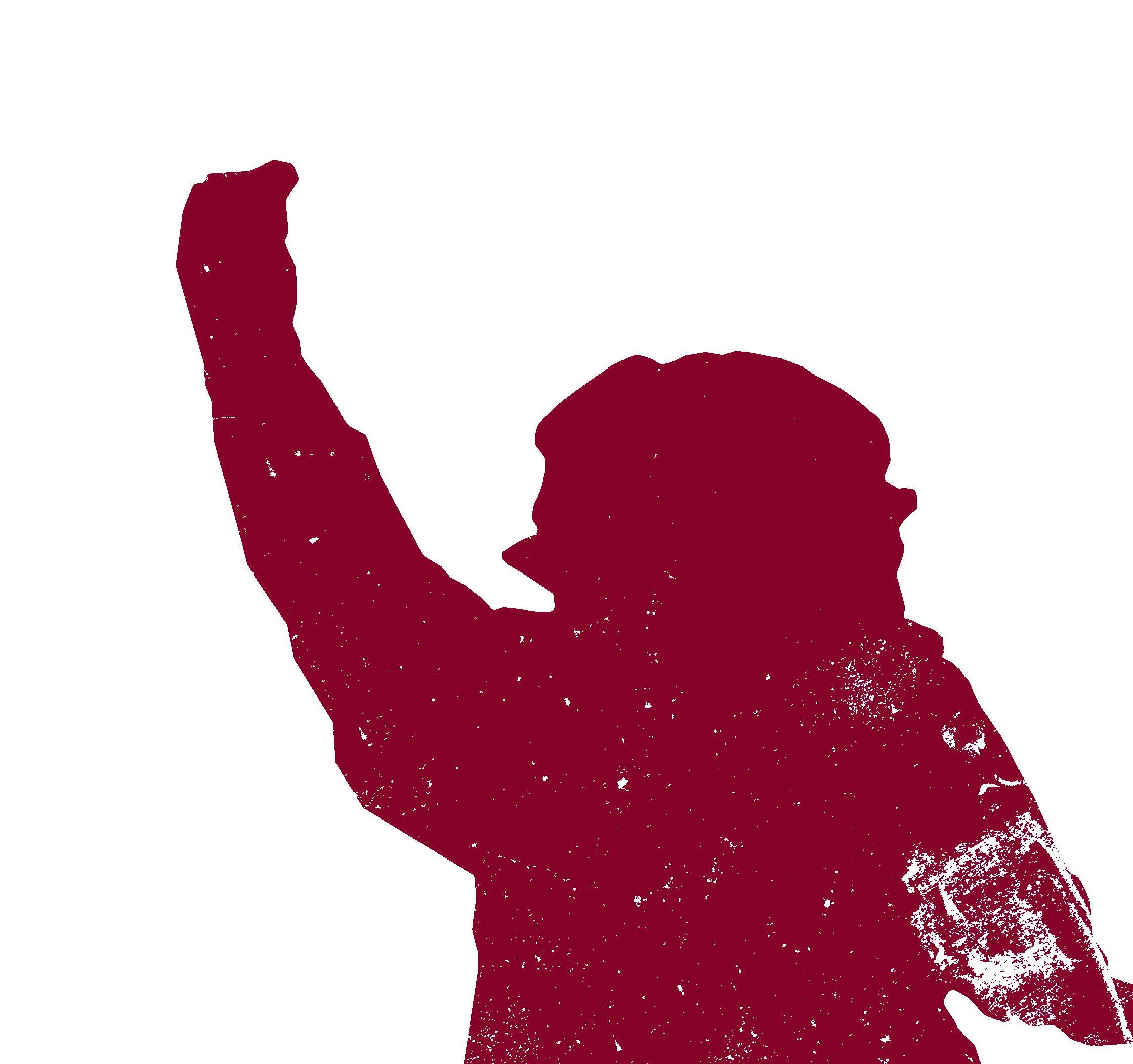
Sydney Cranmer
ART DIRECTOR
Krista Larson
CREATIVE SERVICES
Ilona Donovan
Sabrina Hampton
Jada Mack
Savannah Nagy
Kaylin Daniels
Rachel Jackson
Emily Okon
Mariah Perry
Tyler Sprague
COPY EDITORS
Bridget Tracy
Jessica Proulx
Mafe Balthazar
Alicia Caracciolo
Francesca Cumello
Kaylin Daniels
Will Kelly
Madison Lee
Lauren Russo
Tyler Sprague
Katryn West
Sophie Wurster
Sydney Evans
Ryan Forbes
Kylie Kurinsky
Donovan Ouzts
Sofia Sabatino

Student Government
Career
Substance


University
GarnetGate TRIO
TO ALL the new, returning, and graduate students, alums, family members, and community members, WELCOME HOME! My name is Tyler Sprague, and this will be my first year as the marketing director of Garnet Media Group and I would like to personally introduce you to Carolina Insider 2023!
For many years, Carolina Insider has been a staple of Garnet Media Group’s student publications. This is the essential guide for new and returning students to the departments and resources of Student Life. Carolina Insider will help you make the most of your Gamecock experience.

I am originally from a small mountain town in northern California, so you can imagine the culture shock I experienced moving across the country and settling here in Columbia. However, I was quickly welcomed in by the abundance of friendships and memories created in my first few years. Having set roots in South Carolina, I can proudly call USC my home. So, in the spirit of returning home, here is some advice for the upcoming year


Step outside of your comfort zone at LEAST once. Join a new club, take up an intramural sport, take your friends out to a restaurant or bar you’ve never been to, go to a sports game you don’t usually attend, dress up and see a show at the Koger Center, or find a study abroad experience. The opportunities are endless on and off campus, so take advantage and be fearless in pursuing your best Gamecock experience!
Keep an open mind. USC is home to people with many different identities, backgrounds, ideas and perspectives. Being able to meet and connect with people is one of the things that makes USC so great. So be honest, kind and understanding toward others so we all can feel at home.
Savor. Every. Moment. As much as it pains us to think about it, your time here at USC will eventually come to an end. Cherish every friendship, experience and memory you come across. Appreciate the highs and lows, as the lows can teach you the most significant lessons.
I hope this advice is valuable and helps you improve your Gamecock experience. We look forward to welcoming you all home this year. Please enjoy Carolina Insider 2023, and keep an eye on the stands for more GMG publications coming out later this year!
Tyler Sprague Marketing Director | Garnet Media Group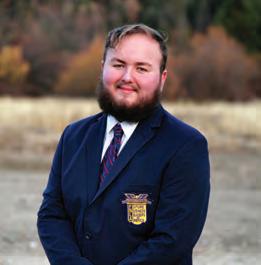
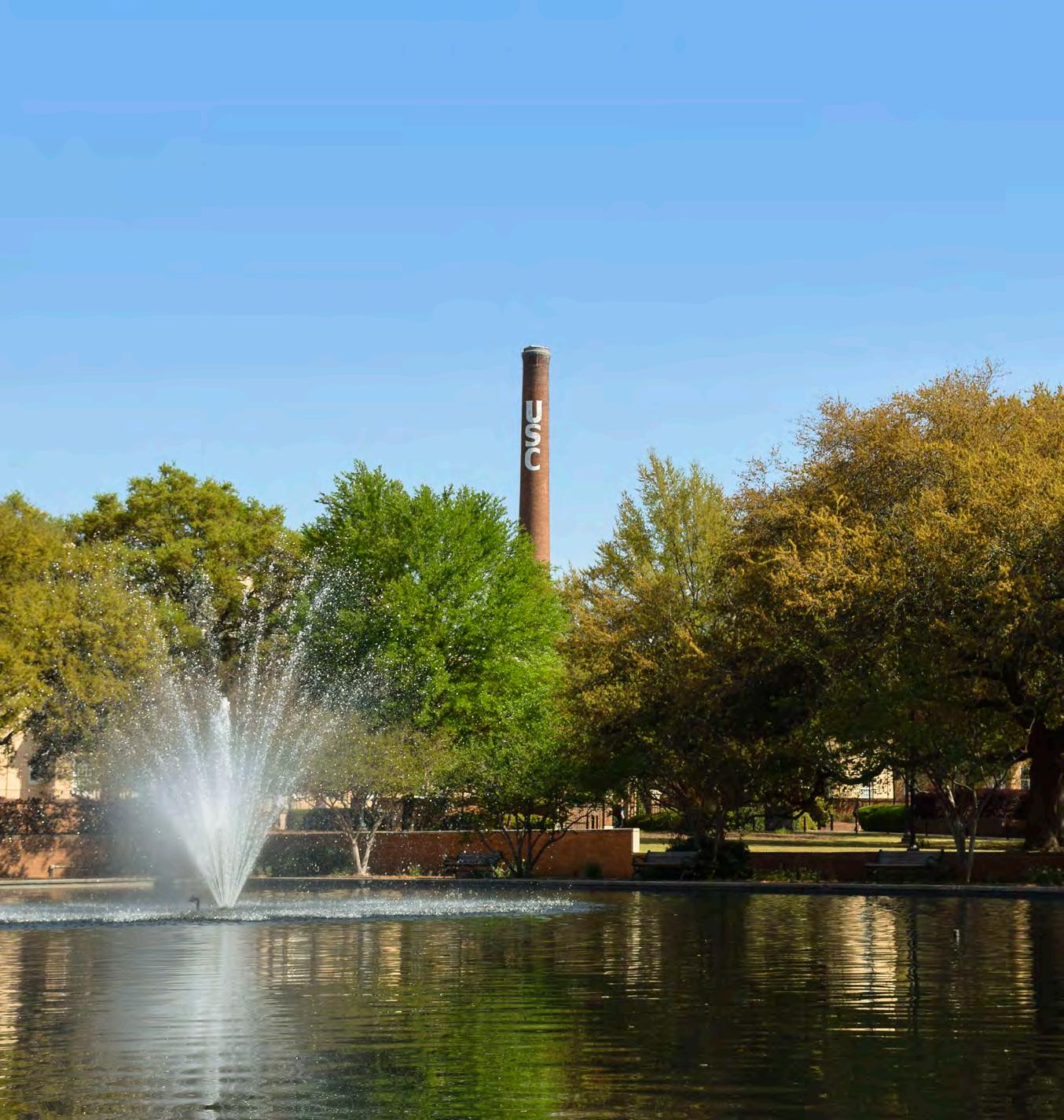
AT THE BEGINNING OF EVERY SEMESTER, the University of South Carolina campus comes to life as our students arrive. Whether you are here for the first time or returning after summer break, we are excited to welcome you to your USC home.
This campus was my home for more than 20 years, from the time I arrived as a chemical engineering professor in 1994 until I left in 2015 to become chancellor of the University of Illinois Chicago. Last summer, I returned home to Carolina to become its 30th president. And I have enjoyed every moment I have spent here.
USC is a community of possibilities. No matter what you hope to learn, experience, or achieve, you can find a path to make it happen here. Please explore these pages to discover the student organizations, campus resources, service and learning opportunities, entertainment and fellowship options, and career guidance that will help you make the most of your time at Carolina.
USC is also a campus rich in beauty, history and culture. I hope you will get to know your Carolina home by exploring the historic Horseshoe and green spaces, by attending concerts, plays, exhibits and other cultural offerings on campus, and by indulging in your unique surroundings. And I trust you will also find your way to Williams-Brice Stadium, Colonial Life Arena, and Founders Park to enjoy some Gamecock athletic competitions!
Finally, USC is a place to become family. As a Gamecock, you are connected not only to the friends and classmates you meet each day, but also to a family of more than 340,000 alumni around the world who will be happy to greet you with a “spurs up” or a “Go Gamecocks!” if your paths should cross.
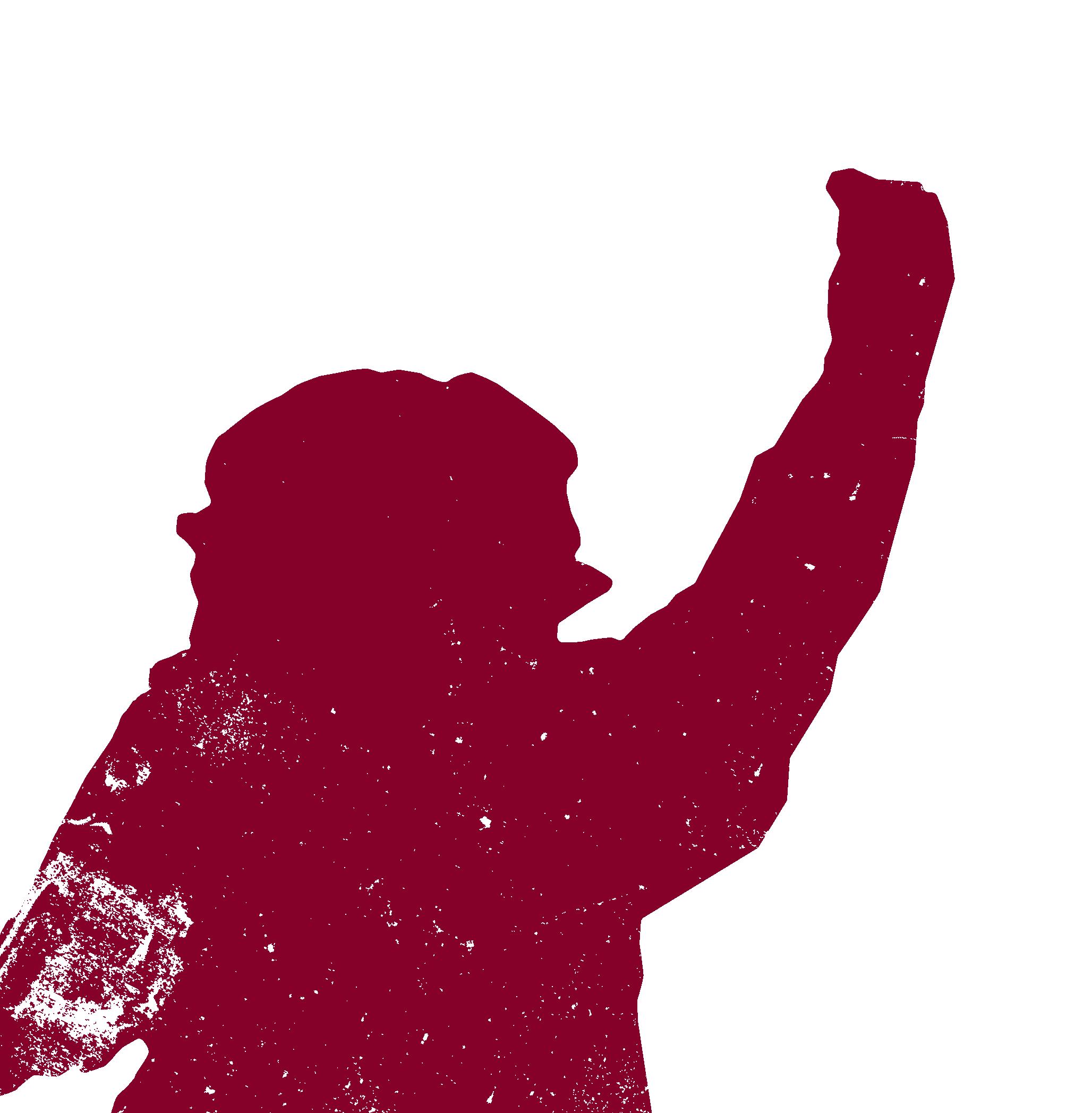
Welcome home! I wish you all the best during your time at the University of South Carolina!
Michael D. Amiridis President University of South Carolina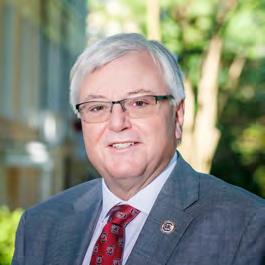

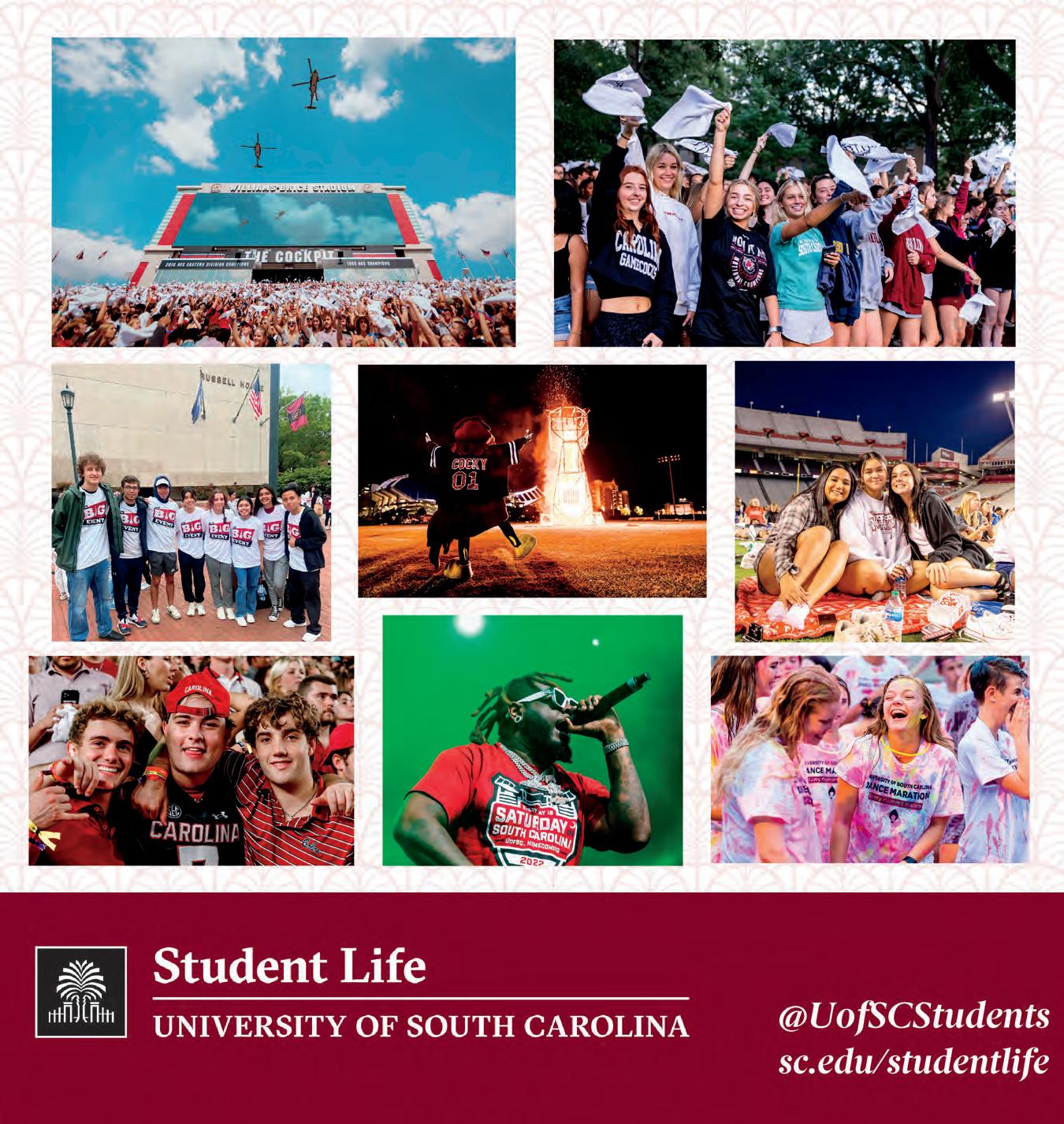


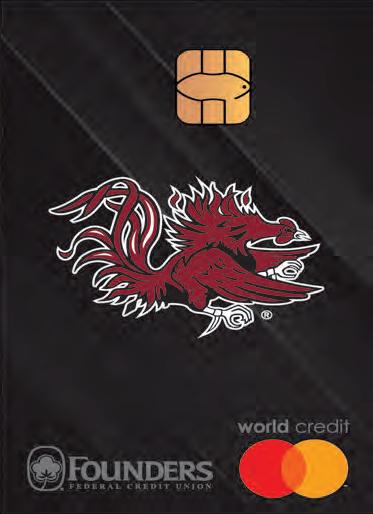
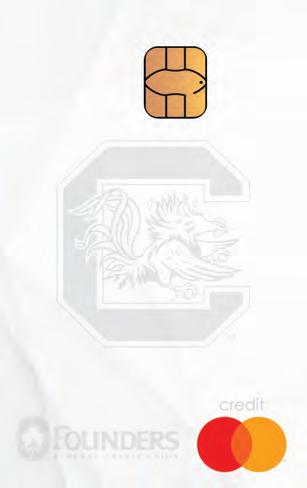
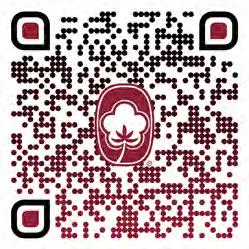
THROUGHOUT YOUR TIME here at USC, you will start to feel like there is no better atmosphere at a sporting event than the ones here in Columbia. In the fall, Saturdays in South Carolina are meant to be spent in WilliamsBrice Stadium. The winter doesn’t feel cold while waving rally towels for the women’s basketball team in Colonial Life Arena, and the spring is designed for days watching walk-off wins at Founders Park. Cheer on the Gamecocks’ 21 varsity sports teams with no additional costs for students.
“I love the connection that sporting events bring us; it helps build community,” said Erin Lewantowicz, a student intern for the Athletic Department. “There is truly no place like Willy-B under the lights. I think it is really cool how so many people can come together for one team!”
The University of South Carolina is one of two schools in the Southeastern Conference (SEC) that offers free tickets to students, with the other being Vanderbilt. Tickets for all Carolina sporting events are included in tuition for all full-time undergraduate students, while part-time and graduate students can pay an optional athletic event fee to receive the same access. Other SEC schools charge students upwards of $300 for football season tickets, so this is definitely a significant perk for Carolina students eager to experience college athletics.
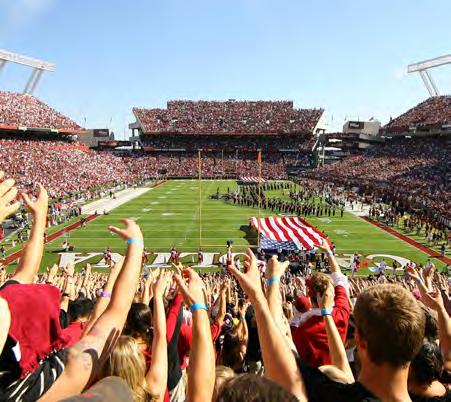
“Because of the free tickets and the demand, we have the point system to award tickets,” Assistant Athletic Director Joe O’Clair said. “Since students have to attend other athletic events to earn points, it helps us increase attendance at those sports and create a better home field/court experience.”
Students can gain entry to most Carolina sporting events by simply showing their CarolinaCard, which the school issues during orientation. There is a request-and-claim system in place for football, basketball and baseball due to the high demand for tickets to these events. The Cockpit Rewards app is essential for all students, and it shows upcoming events for all sports teams, the point amount needed to go, and the point amount earned once you attend the event.
Reward points are how the university chooses which students earn tickets for high-demand football, basketball and baseball games. Students with the highest amounts of points receive tickets first, and and allocation continues in descending order until all tickets for the student sections are distributed. If tickets go unclaimed, those will later be distributed as well. Students receive their first set of points at the beginning of the school year based on grade level: freshmen receive three points, sophomores receive four points, juniors receive six points and seniors receive eight points.
By Madison Lee

The process for claiming tickets varies per sport, but all information can be found on the Student Tickets section on the USC website: sc.edu/studenttickets.
Football Claiming Process:
Ticket requests for football games will open Friday at 9 a.m. the week before the home game and run until 3 p.m. on Tuesday the week of the game. Going through the request process does not guarantee a ticket to the game. Tickets are awarded based on reward point amounts. On Wednesday at 10 a.m., students will receive an email notification of their awarded ticket, which will be loaded into their student ticket accounts. These will be either upper-level or lower-level based on reward points. Lower-level ticket distribution starts with the highest amount of points and works downwards until all allocated tickets are given out. Then the upper-level tickets will be distributed to the remaining students. The upper-level student section is in sections 508 and 509, while the lower level is in the end zone.
For students who don’t receive a ticket through the request process, the on-demand period will start Thursday at 3 p.m. Tickets will be firstcome, first-served, so it is crucial to request quickly.
The closer you are to graduation, the more points you receive, but that does not guarantee game tickets. You must continue earning points to continue getting tickets and to get the best tickets available. Points are also achieved by attending any sporting events. All matches earn you at least one point, and SEC matchups award two points for attending. Students can pay to join the Gamecock Student Club to earn additional points and a Cockpit T-shirt. At the end of each school year, 10% of the points a student earns will roll over to the following year. In the fall, football season comes around very quickly, and points are needed to attend home games at Willy-B. Both soccer and volleyball start in early August, so attending these is an easy way to earn rewards points to help ensure underclassmen receive tickets to football games that are early in the season.
If you cannot attend the game, you must return your ticket by 5 p.m. on Friday. Students who fail to do so will receive a penalty strike on their account. Students who wish to bring a guest can purchase a guest ticket when they request their student ticket. However, guest tickets will always be in the upper level requiring the student who bought them to be placed in the upper deck. The price of guest tickets will vary by game.
Basketball and Baseball Claiming Process: Basketball and baseball tickets can be claimed any time before the game using the Cockpit Rewards app. Just select the game you wish to attend and click “claim ticket.” Present the barcode given to gain admission into the event.

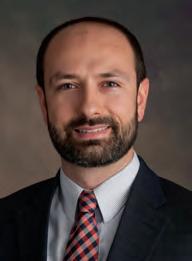


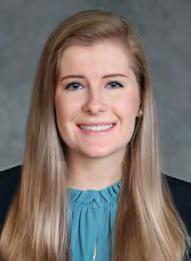
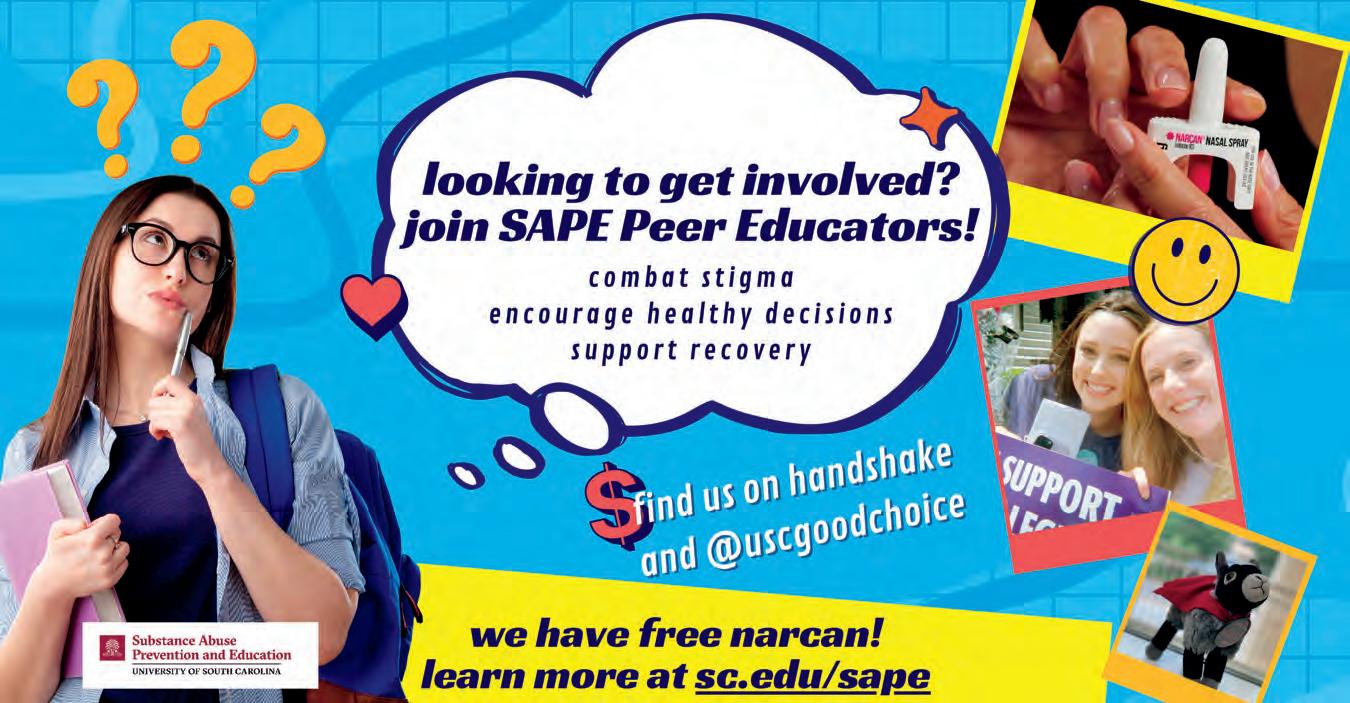











CAMPUS RECREATION COVERS a lot more than just the campus gym. Free access to the Strom Thurmond Wellness and Fitness Center and the Solomon Blatt Physical Education Center are part of what Campus Recreation provides students, but it encompasses much more as well.
The Wellness and Fitness Center houses three floors of activities, including free weights, dance studios, basketball courts and a 52foot climbing wall. The facility houses two pools, one indoor and one outdoor. When the weather is warm, beach volleyball courts are open for students to play outside.
The Physical Education Center has additional workout equipment, group exercise rooms and squash courts. The Outdoor Recreation Hub can be found here, where students, faculty and staff can rent discounted equipment for outdoor activities. Hiking, kayaking and rafting supplies are available for rental.
In addition to the offerings at the fitness facilities, Campus Recreation provides students with several ways to get involved in fitness. Programs include group exercise classes, intramural sports, club sports and personal training.
Group exercise classes range from cycle and dance to pure cardio and total strength. Students can try these classes for free during the first two weeks of the semester and then can purchase an all-access pass to classes for the remainder of the semester. Students can use the online system IMLeagues to reserve spots in classes.
Intramural sports provide all students, regardless of skill, a place to play at a friendly level. There are no tryouts for intramural sports, and students can create or join a team through
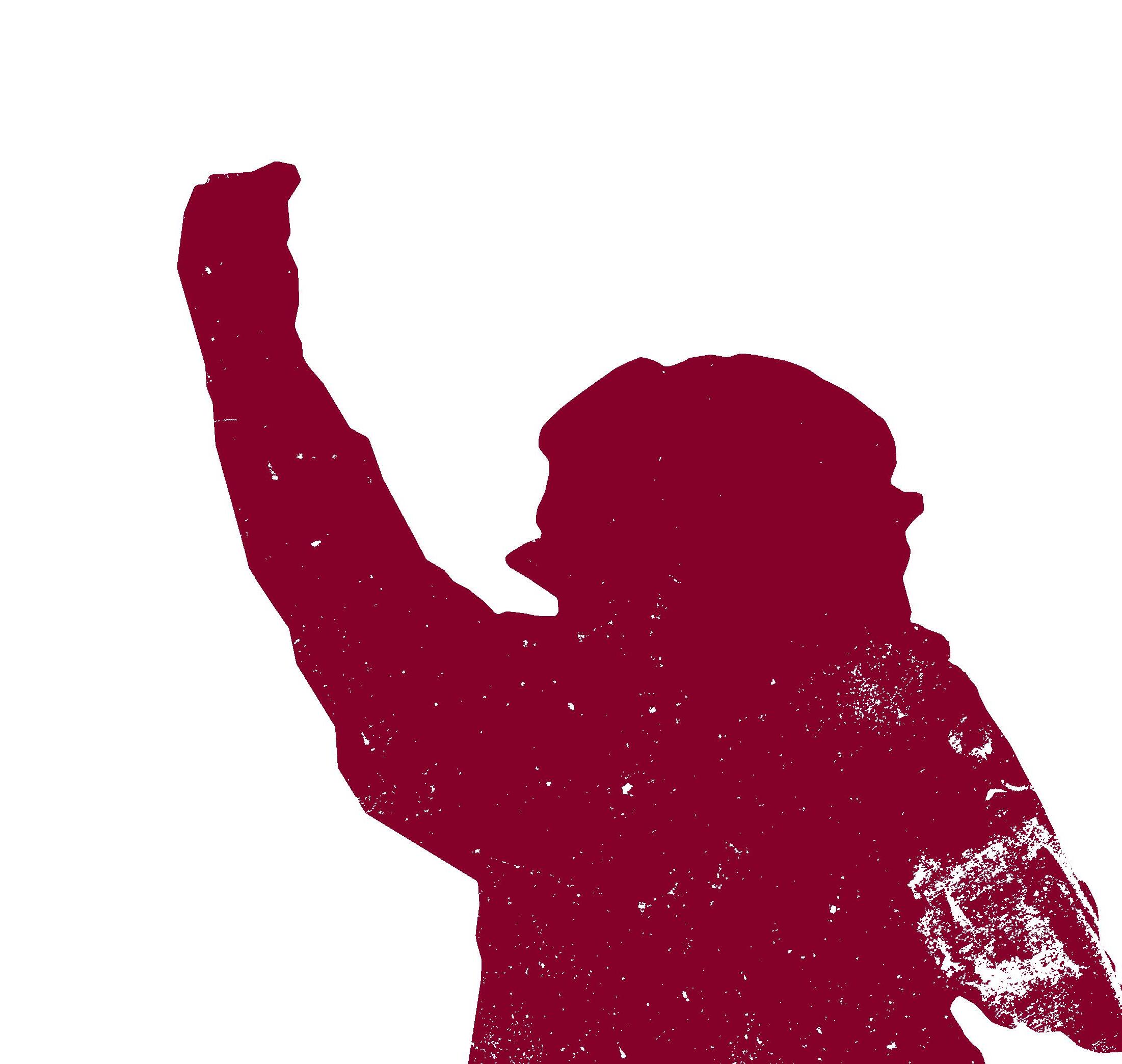
IMLeagues to participate in once-weekly games throughout the semester. More than 10 sports are offered per semester that range from flag football to table tennis.
Sport clubs also fall under the umbrella of Campus Recreation. These organizations are created and led by students. There are currently over 55 sport clubs offered on campus ranging from traditional team sport clubs, dance sport clubs, martial arts sport clubs, water sport clubs and more. These organizations range from instructional to competitive and generally require a higher time commitment than intramural sports. Many sports clubs compete against different universities and travel for competitions. In 2022, the Gamecock Men’s Lacrosse Club won the Men’s Collegiate Lacrosse Association National Championship.
Between intramural sports and sport clubs, campus recreation provides students with many opportunities to try out new sports or hone their existing skills.
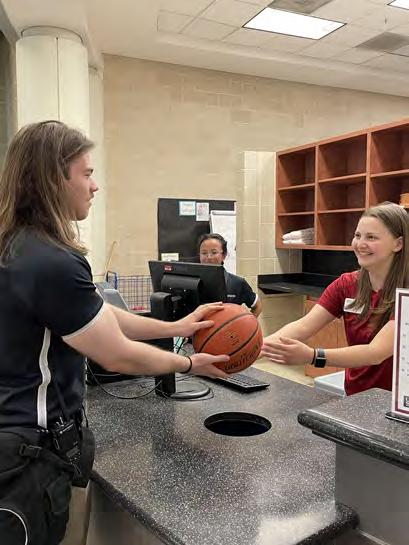
For students looking to explore outside of campus, adventure trips, such as hiking, mountain biking, canoeing and more, are available most weekends both in and outside of Columbia. These trips require a small registration fee to cover the cost of equipment and transportation.
In addition to encouraging fitness, Campus Recreation has services to help students stay healthy while on campus. Athletic training services are free for all students, as well as faculty and staff with memberships to the Wellness and Fitness Center. Trainers are healthcare professionals sponsored by Prisma Health Orthopedics. Through IMLeagues, students can schedule an appointment for professional treatment administered at the
Wellness and Fitness Center.
To employees of Campus Recreation, the job is about much more than physical fitness opportunities. Assistant Director of Operations
Justin Furlough notes that the gyms see almost 17,000 people go through the doors daily, and he wants to pay attention to all the faces he sees.
“We serve as a hub for almost half of the people on campus, and we’re also the eyes and ears for our partners in Student Health Services,” Furlough said. “We can literally hit every dimension of wellness on a surface level and then get them to someone that can help them further if what we give them doesn’t work.”
 Photography by Tyler Sprague
Photography by Tyler Sprague
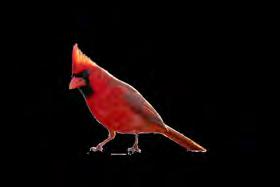
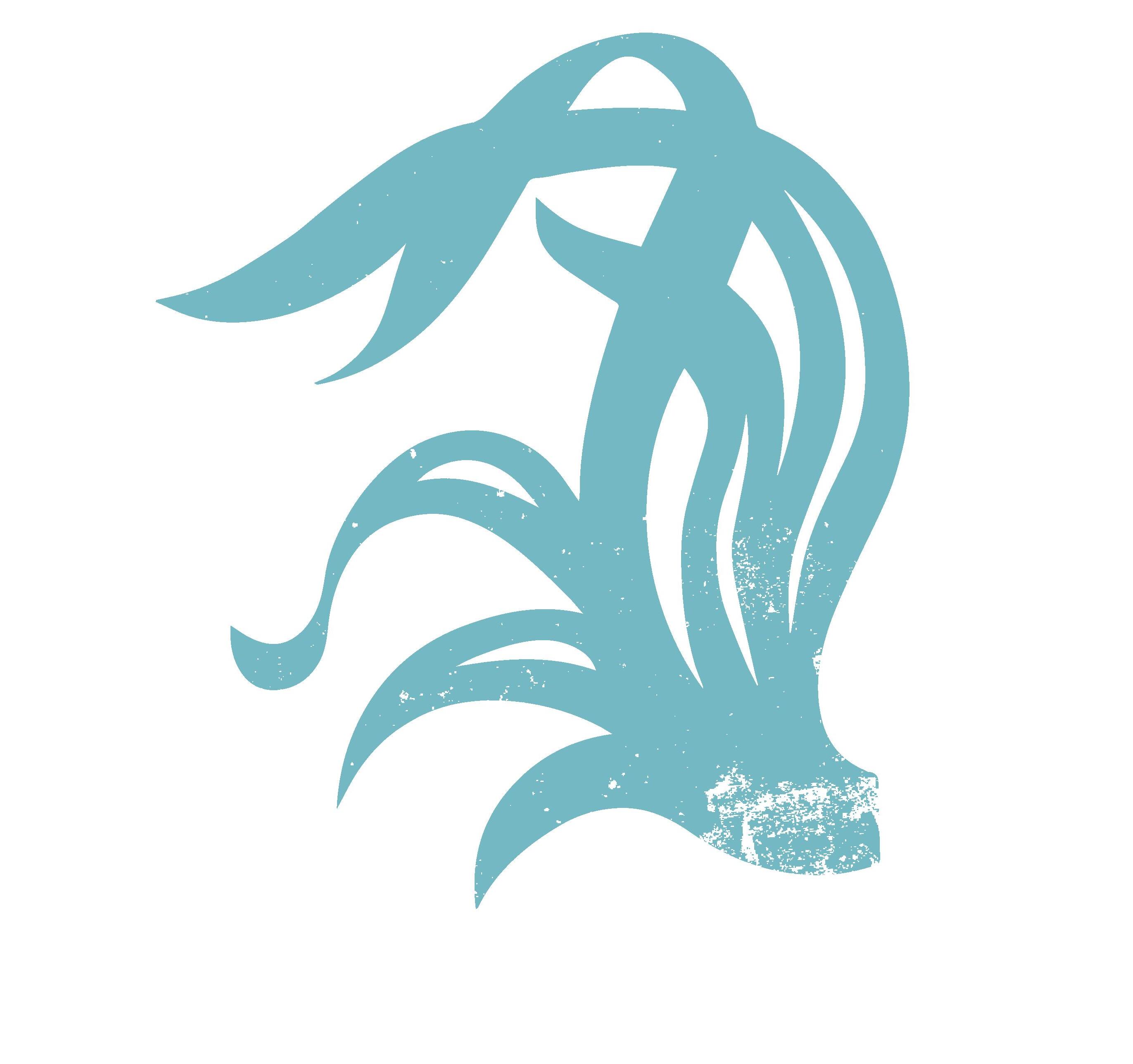
THE OFFICE OF Fraternity and Sorority Life works to promote the values of scholarship, leadership, service and friendship among the 47 Greek organizations and four councils — College Panhellenic Association (CPA), the Interfraternity Council (IFC), the Multicultural Greek Council (MGC) and the National Pan-Hellenic Council (NPHC) — that reside on USC’s campus. The office advises the organizations on various topics, such as safety, and staff act as guides to help grow the community.
“Keep an open mind and explore your options,” Associate Director of Fraternity & Sorority Life Josh Schuman said. “We have so many fantastic fraternity and sorority organizations, each with their own personality, that we are confident you’ll find a fit.”
While each of the 47 Greek organizations upholds the four main pillars of scholarship, leadership, service and friendship, each has its own values, beliefs and philanthropies it cherishes. Joining a Greek organization can make the university feel more like home since members gain a group with similar values early on in the college experience.
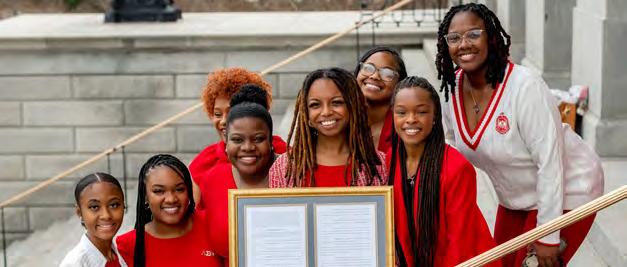

“Going through recruitment exposed and introduced me to so many people. I made friends through my Pi Chi group and when I ran home to Alpha Gamma Delta,” said President of Alpha Gamma Delta Katie Hiner. “These girls have become my support system and my best friends. My sisters show me unconditional love every single day. They have shaped me into the woman I am today … I am also so proud to be part of the Panhellenic community. The community is so open and welcoming. I am so thankful for the positive influence on my college experience that the Greek community has given me.”
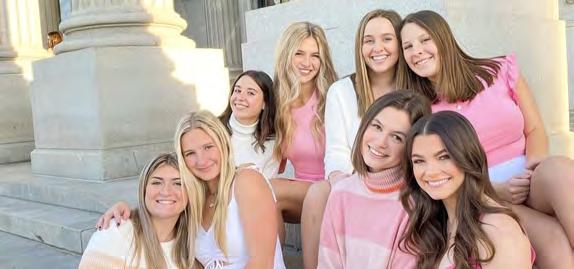
The CPA supports 13 sororities on the Carolina campus, while 22 fraternities are part of the IFC. Twenty of these organizations are housed in Greek Village on the edge of the west side of campus. This serves as housing for approximately 700 Greek students and as a hub for building connections among the chapters.
The MGC is composed of five culturally based Greek-letter fraternities. This community focuses on promoting diversity and unity amongst other multicultural organizations.
 By Madison Lee
By Madison Lee
The NPHC is composed of historically Black Greek-letter fraternities and sororities. The NPHC is also commonly referred to as the Divine 9. The University of South Carolina is home to eight of the nine organizations, and these groups promote the well-being of their members and leadership opportunities.
“During the Fall of 2021, I joined the best fraternity, Kappa Alpha Psi Fraternity, Inc.,” NPHC President Brandon Vereen said. “I am proud to be a member of the Zeta Epsilon chapter and to have been able to see it grow tremendously since my initiation. I believe that others within the NPHC have also contributed to my experience as they have helped me learn and grow as a person.”
All Greek organizations come together for multiple events and conferences throughout the year, with the most notable being Homecoming. In pairs or larger groups, the Greeks will participate in Trick or Treat with the Greeks and Spurs and Struts, a dance competition held in the Columbia Convention Center.
In addition to Homecoming, the Office of Fraternity and Sorority Life offers a variety of resources to the councils throughout the year. These include New Member Summits at the beginning of the new member process and the Greek New Member Experience, which helps newly initiated members build connections with other students. The Leadership Conference and the President Retreat help the leaders in the chapters connect with one another and become more educated on strategies and relevant training for their respective positions.
Recruitment looks different from council to council. The CPA chapters participate in primary Panhellenic Recruitment in August before classes start and the IFC intake starts after classes begin. While joining MGC and NPHC, students should look for the Intake Orientation hosted by each chapter.
The Greek life student population makes up almost 30% of the undergraduate body at the university. According to the Office of Fraternity and Sorority Life, the average GPA of a Greek student is 3.46 and 21% of the
community maintains 4.0s. The four councils partner with the Student Success Center doing programming while also doing their in-house academic support.
Participating in Greek life comes with expectations and responsibilities as presented by each individual chapter, but there are many benefits to be reaped. There are lots of friendships to be made, memories to have and connections that’ll last a lifetime.
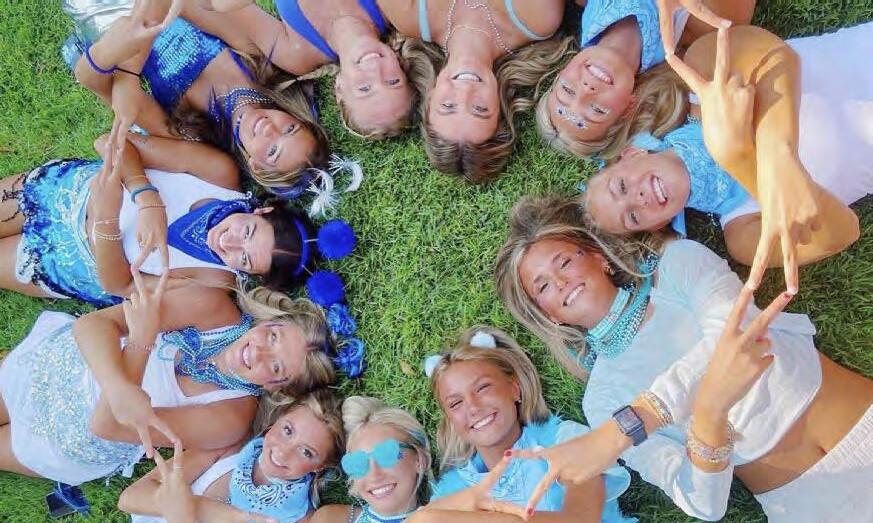
For more information on fraternity and sorority life, visit their section on sc.edu.

The Center for Integrative and Experiential Learning is here to help you leave your mark. Through their vast amount of resources and Graduation with Leadership Disctinction program, you can truly get the



There’s
Grants are available to students, sta , and faculty!

most out of your time at Carolina.
a variety of funding options available for everything you’re wanting to accomplish.
GLD is the perfect opportunity to re ect on your accomplishments and involvements at Carolina!Photography provided by The Office of Fraternity and Sorority Life
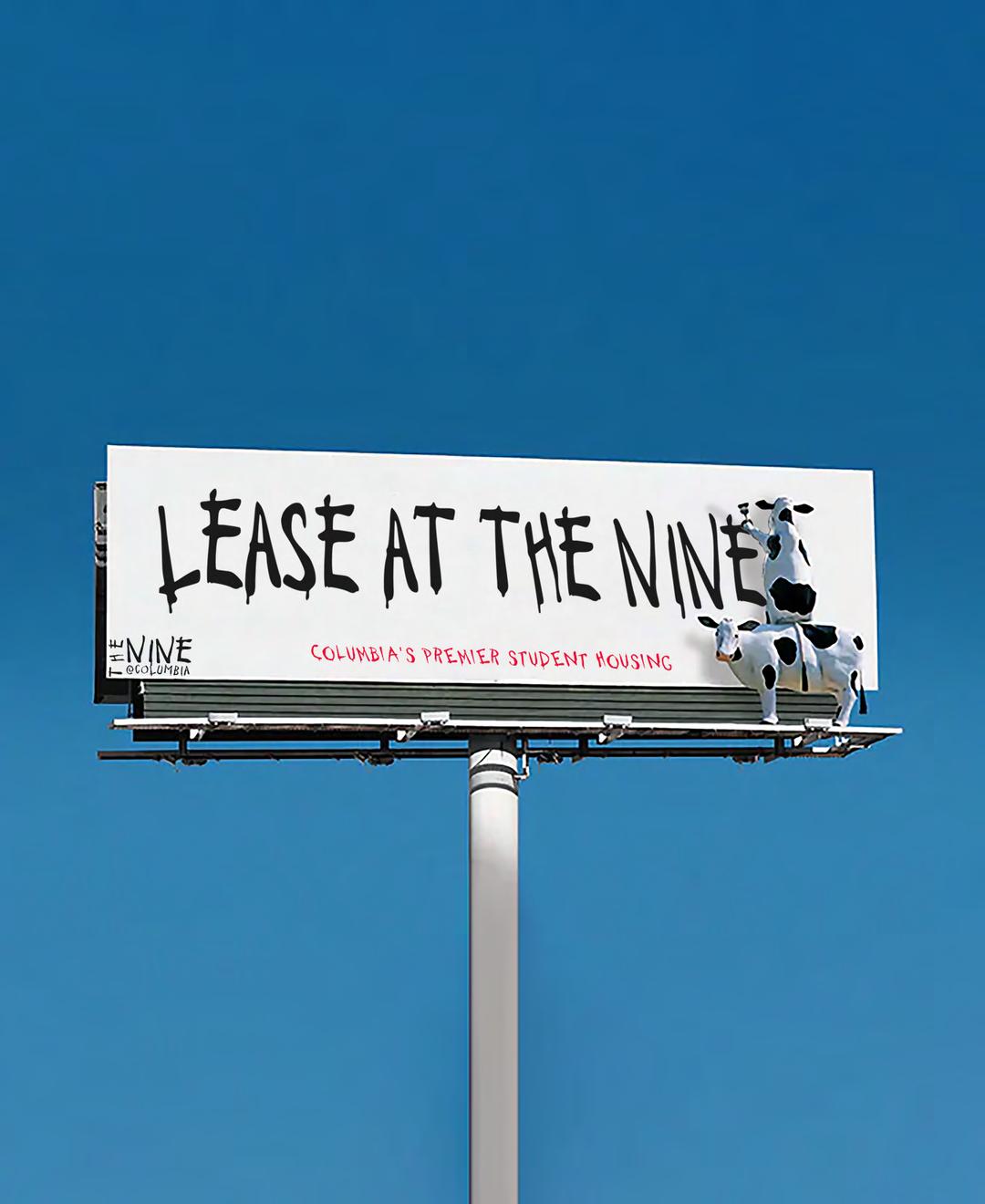
GARNET MEDIA GROUP is USC’s home for print, digital and broadcast media. Garnet Media Group (GMG) is the partnership between the four student-run media organizations at the university: The Daily Gamecock, Garnet & Black magazine, Student Gamecock Television (SGTV) and WUSC-FM. There are also four support teams: advertising, creative services, marketing and podcasting. This allows students to see what the world of media production holds for them, and its viewers can see a wide range of media curated for broad audiences.
The Daily Gamecock is a student-run newspaper that publishes daily website content, daily email newsletters and three, monthly print editions each semester. Students have the opportunity to work for either news, sports, opinion, arts & culture, copy desk, photo, design or the engagement team.
Assistant Director of Student Media Sydney Cranmer started writing for The Daily Gamecock during her freshman year at USC. Beginning as an arts & culture reporter and opinion writer, she eventually became copy desk chief and editor-in-chief. Now, she works with students as a staff member and gives them the advice and resources they need to succeed.
“This is the only place where you can do anything you want,” Cranmer said of students’ freedom to make all content-related decisions for their organizations.
“There is no editorial-related decision that I make, ever,” Cranmer said. “I’m here as a person to give guidance, but I don’t decide what runs, I don’t decide who reports on what, and I like it that way!”
SGTV, the student television station, publishes on its website, YouTube and social media platforms. There are five branches within SGTV that produce news, sports, entertainment, short films and narrative television (1080C Productions), and sketch comedy (Carolina Tonight). Student opportunities like acting, script and news writing, reporting and video editing are available in all of these branches, with other media production work as well.

Nick Hill, a sophomore studying visual communications, served as SGTV’s marketing director and a photographer for The Daily Gamecock during the spring. Working both positions allows Hill to take the lead on social media projects for SGTV while being able to relax and enjoy his other interest, taking pictures.
“It’s kind of nice being in an (executive) role for one (organization) but then a regular staff member for another,” Hill said. “It’s very much different from the social media aspect. I don’t have to worry about uploading anything, I just have to worry about getting my pictures in.”
Garnet & Black Magazine produces two print issues a year (one per semester) and publishes online content throughout the academic year. The team of designers, photographers, writers and editors create longform articles and stories focused on issues of general interests in the Carolina community, with a special focus on social justice, arts, culture and local highlights.

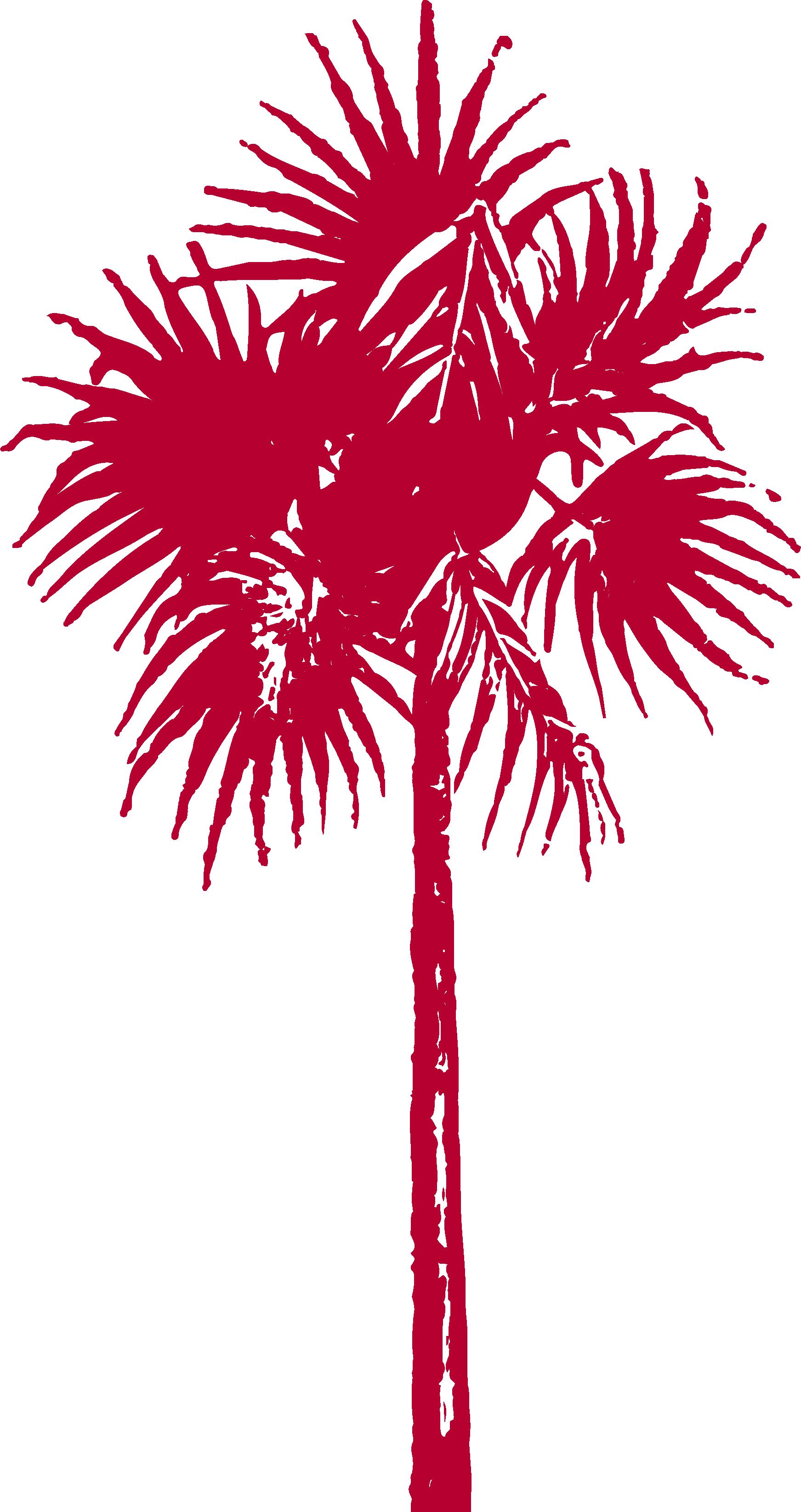
WUSC is the university’s radio station, broadcasted on 90.5 FM and HD-1 Columbia, and reaches a 30-mile listening radius. WUSC is unique in that it is noncommercial and non-Top 40, so you’ll always hear something unique. Student DJs can host free-format shows or specialty shows which can focus on one genre of music or a certain type of content. WUSC also has five offices to get involved with including the offices of station manager, news, public affairs, music and programming.
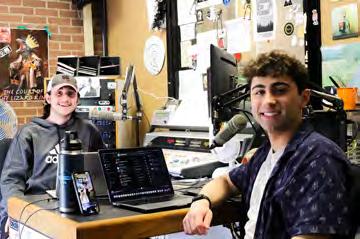
Hill said that his favorite part of being a member of Garnet Media Group is the friends he has made within the organization. Since everyone is working under the same umbrella, he says it feels like all the students are a family trying to accomplish the shared goal of creating content.
Since his leaders are also students, it helps create a friendly, supportive environment. If staffers are busy with schoolwork, leaders are understanding and happy to determine solutions.
“We’re all students. So student-run is always a really nice aspect to it,” Hill said.
“The point is for our student leaders to have that hands-on experience, very near to a reallife scenario,” Cranmer said. “You get a good feel for that, and you build those skills, and you are better at that when you actually have to go out and do it in the real world.”
Garnet Media Group is open to any students of any major. There are opportunities for everyone to make friends and figure out what they genuinely enjoy doing.
“I wish I was in (Garnet Media Group) first semester freshman year because being a part of GMG, you really get to have friends. It’s like being put in one big house, and you just have to be friends,” Hill said. “I couldn’t have traded this experience for the world. I wish I could do it for another four (years) if I had the chance or the opportunity.”
To find ways to become involved in Garnet Media Group, visit garnetmedia.org/join.
Photography by Jada MackTHE LEADERSHIP AND SERVICE CENTER (LSC) is the heart of USC’s student involvement, leaders, community service and civic engagement. The LSC offers many programs and opportunities to students who want a more well-rounded experience at Carolina through its initiatives and through the 550-plus student organizations it oversees.
Organizations include the Academic Team, Carolina Beekeeping Club, Tabletop Gaming Club, Individuals Respecting Identities and Sexualities (IRIS) and many, many more. With so many organizations, you can indeed find one for you.
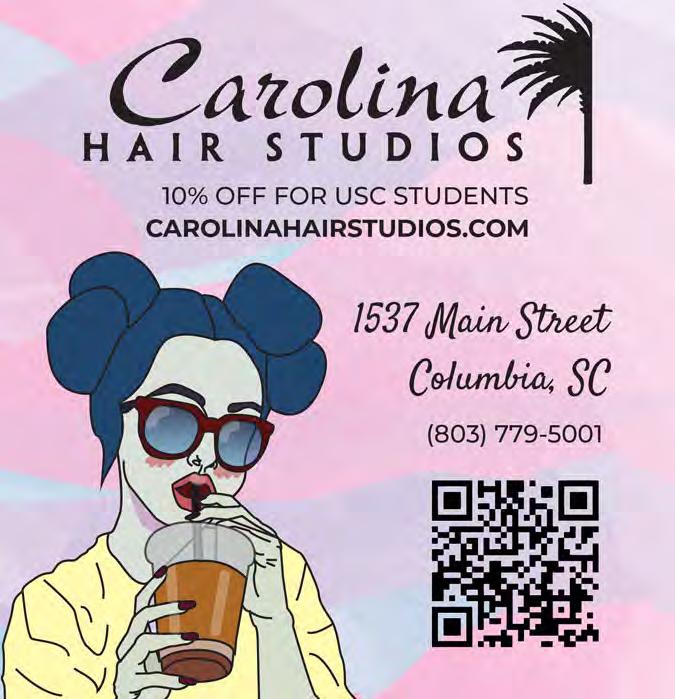
“Many of our organizations are specific to USC, and all are quite individually Carolina, even if they are part of a larger national organization,” said Joshua Cauble, the LSC’s Associate Director.


While Garnet Gate is home to all USC student organizations’ information, one of the best ways to find your options is the Student Organization Fair hosted by the Leadership and Service Center. This event features representatives from USC student organizations lined up along Greene Street who hand out information, answer questions and are excited to meet new students. This year’s fair will be on Aug. 30 from 11 a.m. to 2 p.m. and again from 6 p.m. to 9 p.m. on Greene Street.
Regardless of what organization you choose to join, the LSC hosts a variety of opportunities for students to enhance their leadership skills.
One of the more structured opportunities for leadership development is the Close Family Emerging Leaders Program which starts with an in-person, seven-week program for students who want to build their leadership skills and learn how to bring change to the Carolina community. Older leaders of junior or senior standing can also attend the Student Leadership Summit to network with other engaged students and brainstorm ways to impact campus positively. The
By Tyler Sprague
Student Leadership and Diversity Conference, held annually in the spring, is a multi-day conference with workshops, prominent speakers and opportunities to network with other leaders from USC and other institutions.
One of the LSC’s newest programs, returning this year, is Camp Cocky Leadership Retreat. This free overnight outdoor recreation retreat encourages students without a positional leadership role to network and use their unique skills to improve their team’s cohesion, no matter what that team looks like. The dates for 2024’s retreat will be announced soon.
One of the more student-directed leadership opportunities is Pillars for Carolina. Pillars for Carolina is a student-led summer program that creates a foundation of community and confidence through activities centered around leadership, service and active citizenship to inspire first-year students to leave their mark at the University of South Carolina.
“Being a Pillars XM was my first experience with the LSC and is still my favorite,” previous Pillars mentor Yasmen Balogun said. “I was able to impact other people by just being myself, and I think that’s the best part of being a student leader: The confidence and skills that I gained from this experience have helped me be a better leader, a better student, and a better person.”
For students who’d like to give back to the campus and local communities through service work, the LSC has options ranging from hosting regular service events to alternative breaks, during which students spend a fall, winter or spring break doing a more extensive service project somewhere in the state or region. The LSC also encourages student involvement in areas of civic action, such as voter registration drives and the Civic Leadership Education and Action Team, also known as CLEAT. CLEAT is a group of students who plan and execute nonpartisan events and programs that encourage engaged and active citizenship.
Students interested in leadership, service, civic action or anything in between should follow the LSC on social media or check out the information on the LSC website at sc.edu/leadershipandservice to learn more.


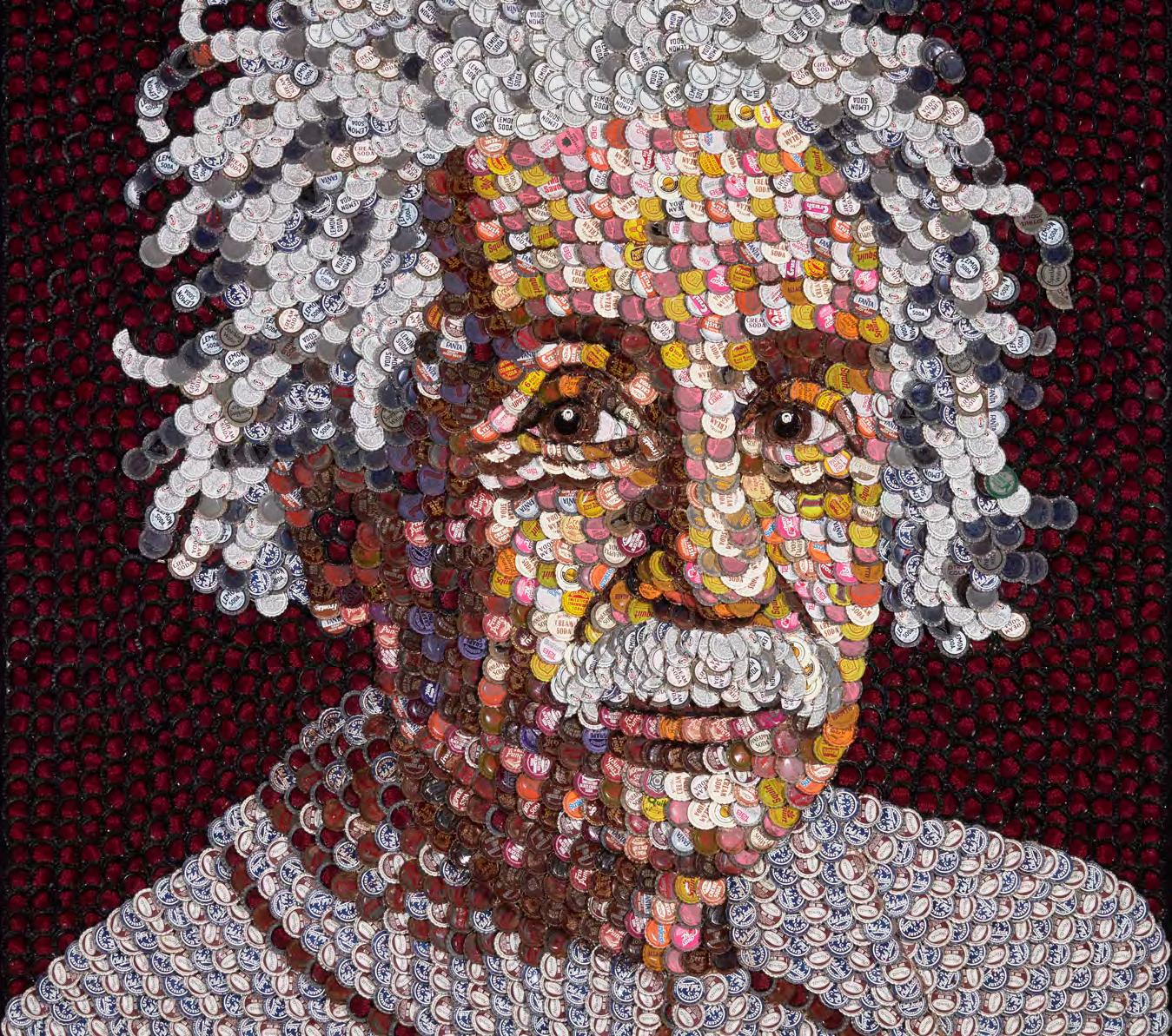

down your preferred living areas. The crime map shows crime activity within the student’s desired area. It’s not meant to scare anyone but to make students feel empowered about their decisions, according to Layman. The walkability map shows how far a neighborhood is from shops, restaurants and places on campus.
By Tyler Sprague & Madison Lee


students, answer questions and give out fun merchandise.
after living on campus for an entire year can be complicated and always brings challenges, and it’s no different for students at USC. While most students must stay on-campus during their freshman year, they typically move off-campus in later years due to personal preference or limited availability of nonfreshmen housing. The Office of Off-Campus Living & Neighborhood Relations helps create a bridge between USC students and local housing options and helps alleviate student stress when finding a future housing situation.
“Our office is here to help students identify offcampus housing options and safely transition to their new environment,” Assistant Director of Off-Campus Living Blair Layman said.
The office is there for students from the beginning to the end of their housing process. When beginning your search, a great place to start is garnetliving.org. The Garnet Living website, part of the resources that Garnet Media Group provide to students, includes options in all the local neighborhoods near Columbia that students frequently choose to live in. These include Cayce, downtown Columbia, Forest Acres, Irmo, Lexington, northeast Columbia and West Columbia.
The office also offers educational materials, including a crime map and a walkability score of each neighborhood around campus to narrow
While many students choose to live with friends or others they met during their first year at Carolina, those who need roommates have nothing to worry about, as the office supplies a message board so students can connect to find leasing options that fit their needs. Guidance from Student Legal Services is also available to you before you sign your lease. The services from this department are covered in activity fees and are most commonly used in reviewing lease contracts. If you have any questions or need help understanding a document before you sign it, this office is a great place to start. Student Legal Services can also help if conflicts arise with the landlord in a student’s new home.
Once a lease is signed, the Off-Campus Living office’s website becomes an essential resource for information, including how to properly report community issues and the student’s rights and responsibilities in their new homes. It also provides information on needed utilities like parking and trash, how to budget for rent and safety tips.
Living off campus, students lose the direct university supervision they once had, which, for some, becomes more of a burden than it does for others. The Office of Off-Campus Living and Neighborhood Relations highlights the importance of students upholding the Carolinian Creed and following the Student Code of Conduct not only in their school work but in their personal lives, because it encourages students to understand the responsibility of representing USC.
The office also partners with Garnet Media Group on housing fairs that are typically held once a month throughout the school year. These fairs allow student housing properties across Columbia to visit campus, interact with

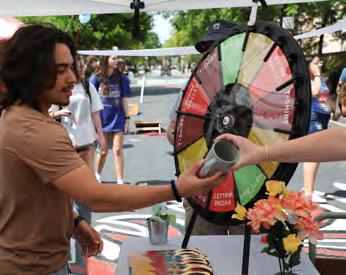
“The housing fairs bring off-campus housing options right to the students. The vendors have fun decorating to that month’s theme and really going all out. It is a great place for students to gather information, look at several living options, and get some cool merch,” former Garnet Media Group event coordinator Tyler Sprague said.
The Office of Off-Campus Living and Neighborhood Relations also holds an annual panel with property managers to connect with students and answer any questions they might have.
In collaboration with the Columbia Police Department, the Student Conduct Office, Student Government and representatives from local neighborhoods, the office provides a comprehensive guide on how to move offcampus. There are also virtual and in-person appointments to ask specific questions and receive individualized help in the housing search. The office is located in Russell House 227 in the West Wing. Everyone in the office understands this process can be overwhelming, and they are more than happy to help students through their individual situations.
“We want all of our students to enjoy an exceptional and safe living experience on and off campus that will ultimately support their success as students and community members,” Layman said.
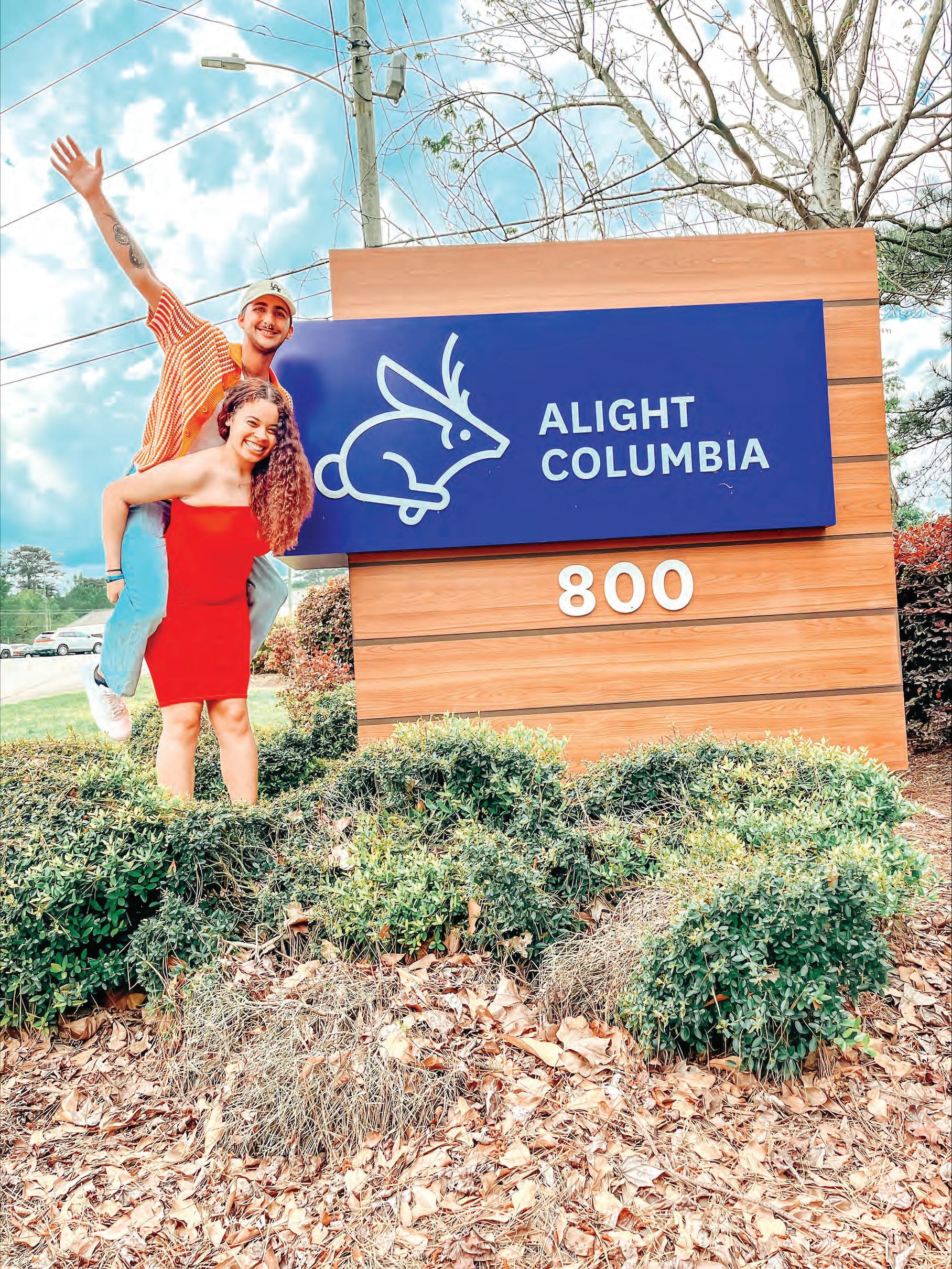


at the University of South Carolina often desire an equal opportunity for success and a positive college experience. The Office of Multicultural Student Affairs (OMSA) aims to “provide support for students of marginalized backgrounds as well as to create a community of inclusive excellence for all individuals on campus,” according to Kimberly Seibles, OMSA’s associate director of diversity and social justice education.
OMSA’s programming and initiatives can be briefly summarized as four main areas: student support, cultural engagement, social justice education and resources for LGBTQ+ students.

USC alumnus Badr Abdullah said being a minority student at a predominantly white institution can be lonely without a robust support system. Programs within OMSA help students find their footing through connecting with other students like them and slowly break down barriers that could hinder their growth.
Abdullah served as a mentor in OMSA’s Multicultural Assistance Peer Program (MAPP) which pairs first-year students from historically marginalized populations with older, experienced students. Mentors are usually one of their mentees’ first friends and help them take advantage of all the university offers. MAPP holds meetings and social events to establish relationships between mentors and their mentees, as well as academic and professional development workshops.
“When you have that one-on-one connection with someone who has already, you know, gone through the ranks, in a way, that person becomes kind of like your first stronghold, your first footing at the university, your first continent,” Abdullah said.
Other support programs for different populations include affinity groups, designated safe spaces for groups of similarly identified people; Black male-focused initiatives like Brother to Brother and Cuts and Conversations, an opportunity to talk with other Black men while receiving a free haircut; and Queer Connections, a support group for first-year

LGBTQ+ students that creates “avenues for students to find a family on campus, but also if they need certain things such as, you know, health support or mental health support or just finding a friend,” Seibles said.
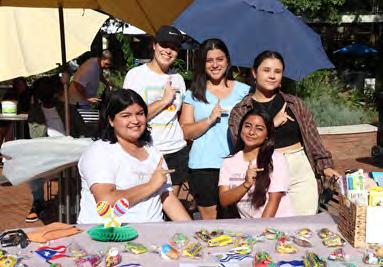
Hip Hop Wednesday, a monthly event held on Greene Street, allows student organizations to promote their diversity, equity and inclusion initiatives and network and have fun while a DJ plays hip-hop in the background.

Identity365, another program within the office, celebrates distinct student identities and cultures year-round through educational and immersive experiences. One prominent Identity365 event is Pridechella, an April event celebrating Pride with speakers, live music, performances from drag queens and opportunities to connect with LGBTQ+ vendors. In addition, Q’afe provides a weekly opportunity for LGBTQ+ students and friends to meet, connect, socialize and relax. Although the Intersection Multicultural Student Lounge is always open to all, Q’afe is designed to be a consistent break for LGBTQ+ students.
 Photography provided by Kimberly Seibles and Kim McMahon
Photography provided by Kimberly Seibles and Kim McMahon
The Intersection Multicultural Student Lounge, located in Russell House West Wing 034 (behind Panera and down the stairs), serves as a physical space for conversations and connection within and between affinity groups. Students can hold meetings, work on group projects or just hang out in the multipurpose room. The lounge is open Monday through Thursday from 8:30 a.m. to 8 p.m. and Friday from 8:30 a.m. to 5 p.m.
In addition to providing support and celebrations of different identities, OMSA strives to educate the broader Carolina community on important social justice issues.
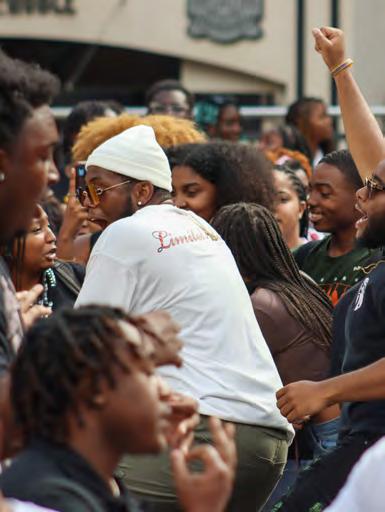

One of the ways the office accomplishes this goal is by empowering students to educate each other through the OMSA Peer Educators program. Peer Educators host workshops for students, lead small discussion groups on relevant topics and generally support OMSA’s work across campus.
The office also partners with different departments across campus, such as the Office of Sustainability, to lead discussions on current issues, including environmental justice. “We pretty much partner with everybody who has shown a real key interest in trying to improve diversity, equity, and inclusion on campus,” Seibles said.
OMSA provides educational programs on social justice and diversity, including a daylong Carolina Diversity Retreat and ongoing Diversity Dialogues, to help students advocate and become activists for topics they are passionate about, from environmental social justice to the LGBTQ+ community. Through OMSA’s many programs, students learn to interact with those of different identities, make a difference in the community and become accomplished and aware global citizens upon graduation from USC.
Learn more about the many opportunities to get involved and help by visiting OMSA’s website at sc.edu/multicultural.

The board-certified physicians and advanced practice providers at Carolina Women’s Physicians now offer comprehensive obstetric and gynecologic care in Columbia’s Vista. With additional locations in Irmo and West Columbia, women of all ages can get the care they need — from routine adolescent and well-GYN care to specialized diagnostics and treatments — at a location that’s convenient for them.



UofSC students post for free when using their UofSC email address.






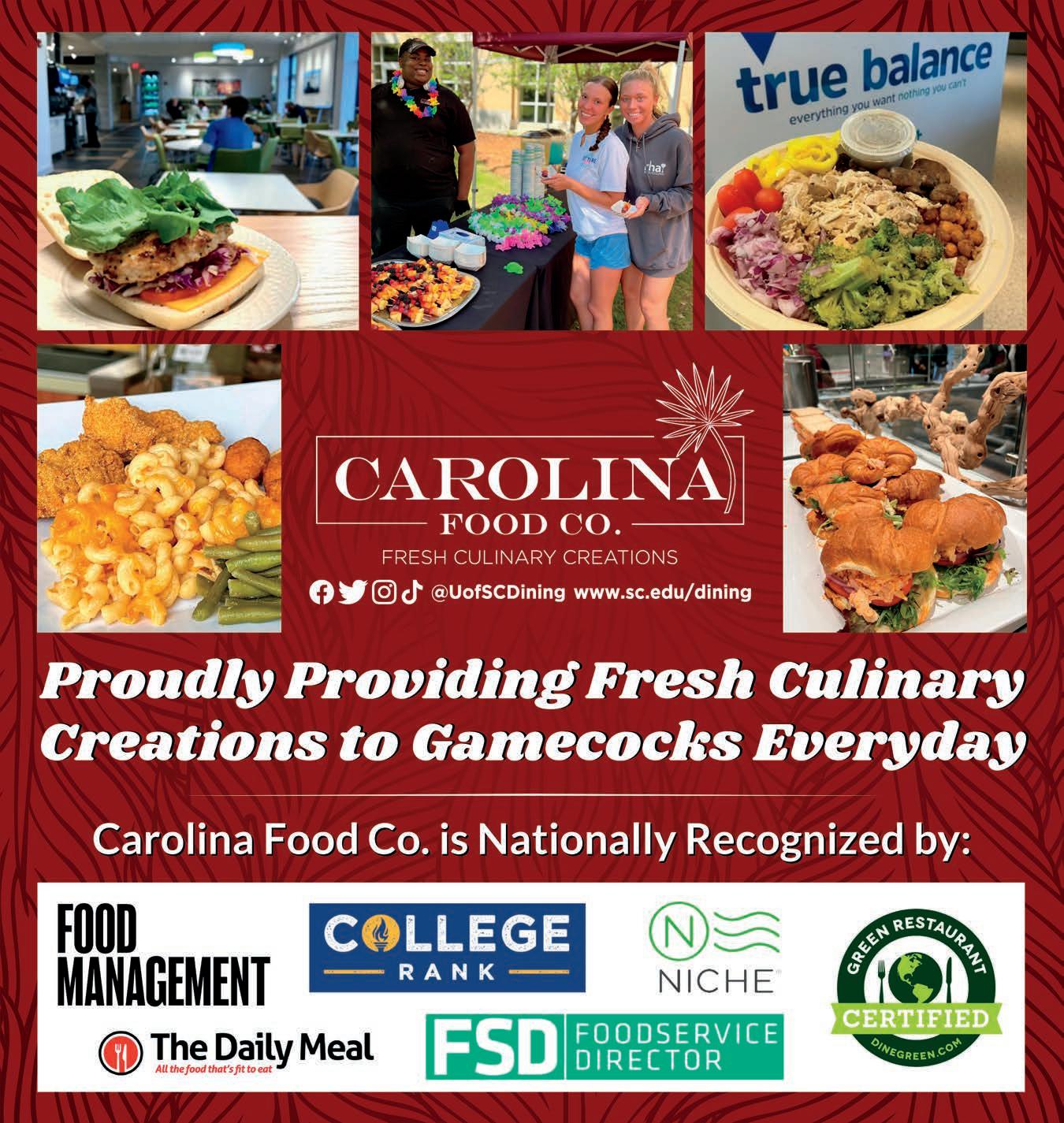
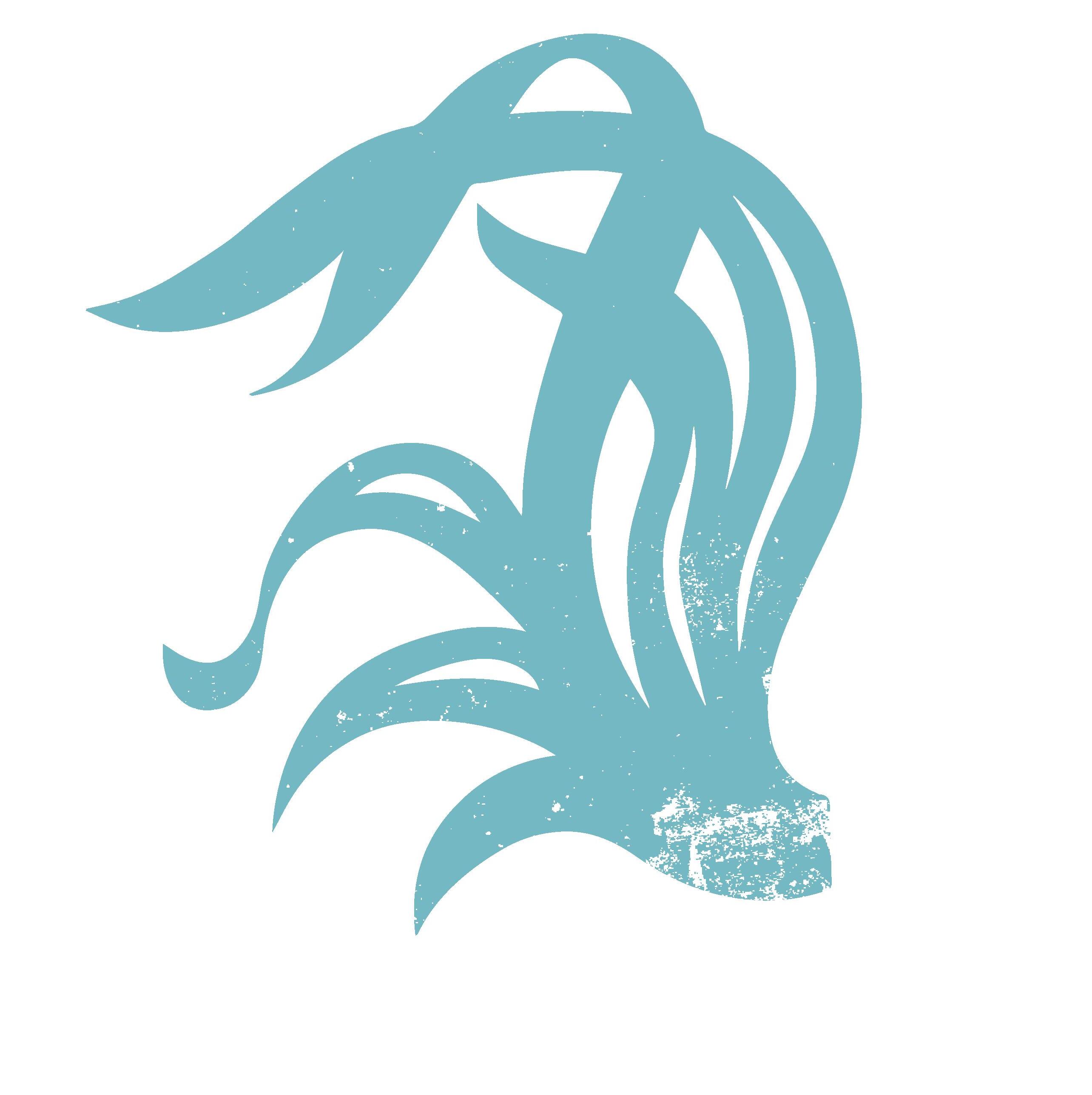
GAMECOCK ENTERTAINMENT is USC’s hub for free and exciting events on campus. The office is divided into different organizations, each focusing on certain community events: Carolina Productions, Homecoming Commission, Dance Marathon, the CarolinaClemson Blood Drive, Thursday After Dark and Tiger Burn. When you join one of these organizations, you immediately become part of the overarching Gamecock Entertainment family.
Carolina Productions is in charge of organizing entertainment events for the students of USC. Students organize all the events, ensuring they are fun and relevant to students’ interests. Some of the club’s events include a drag show, carnival, movie screenings, petting zoos and other fun events for students to meet other people on campus. This past year, Carolina Productions hosted 12 movie nights, a Mardi Gras celebration, a murder mystery night and even a performance from YouTube comedian Noel Miller, all at no additional cost to students. Last year, Carolina Productions had TikTok star and podcaster Brittany Broski host a campus version of The Dating Game. Anyone can join Carolina Productions and assist with these events by attending a weekly Programmers in Training crew meeting.
One of Carolina Productions’ most popular annual events is a partnership with Homecoming Commission to hold the “Cockstock” homecoming concert, which has featured artists like T-Pain, 21Savage and A$AP Ferg.

Homecoming is a weeklong celebration for all current, future and past Gamecocks to show off their school spirit. Homecoming Week features annual events like the Spurs & Struts stepshow, the National Pan-Hellenic Council Stroll-Off, a block party in Five Points and a Homecoming tailgate, all of which end with a Saturday at Williams-Brice Stadium. Homecoming 2023 is planned for Oct. 9–14. Sophomore Ava Uthoff was a Homecoming Commission member this past year and said she most enjoyed working with the others students on the team.
“It’s also so rewarding seeing students enjoy the events we plan,” Uthoff said.
The Carolina-Clemson Blood Drive is a friendly philanthropic competition held the week before the Carolina-Clemson football game to determine which university community can donate more blood for local hospitals and lifesaving procedures. The drive starts at the beginning of the holiday season in preparation for the coming year. Donations are made at Red Cross and Blood Connection Donation sites found around campus throughout the week. All donors receive a free blood drive T-shirt and a chance to win prizes. Students can learn more about volunteering to help with the drive on GarnetGate.
Tiger Burn is another annual rivalrybased event, occurring the Monday before the Carolina-Clemson game. For over 12 years, South Carolina’s
 By Lauren Russo
By Lauren Russo

“tiger,” a 30-foot or taller wooden structure made to look like a tiger, has been built by a group of students from the USC chapter of the American Society of Mechanical Engineers. The tradition was born after a post-game riot in 1902 that was sparked when Clemson students became angry at a drawing showing a Gamecock on top of a beaten tiger.
Thursday After Dark provides late-night entertainment with different activities every Thursday during the semester. Events are often off campus and transportation is provided. Some events from this past semester were axe throwing, goat yoga, a Fireflies baseball game and a night at the State Museum.
Dance Marathon is the largest student-run philanthropy group on USC’s campus. The club works year-round to raise money for Prisma Health Children’s Hospital through the local Children’s Miracle Network Hospital. The main spring event is a 14-hour dance marathon — no sitting or sleeping the whole time! — celebrating all the money raised. Registration for Dance Marathon opens at the beginning of the year and can be completed at any point before the main event through Garnet Gate.
Courtney Buzan has worked for Gamecock Entertainment for the past five years as the associate director for campus programs and says her favorite part of her role is “the students, students, students.”
“It’s nice to see this small group of students find and build their community on campus while they deliver events and experiences that do the same for their peers,” Buzan said. “It truly comes full circle.”
The Gamecock Entertainment office is located on the third floor in Russell House in suite 318 and can be contacted by email at ge@mailbox.sc.edu.
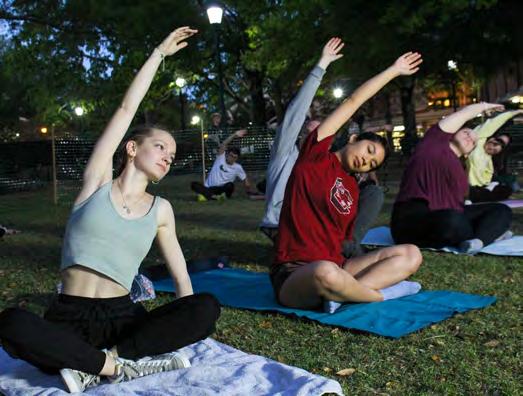 Photography by Emily Okon
Photography by Emily Okon


THE OFFICE OF PARENT
PROGRAMS can help families of USC students find all the information they need to help stay informed and connected throughout their student’s time in college. According to the director of Parent and Family Programs, Leena Holt, the office is a one-stop shop for families of students.
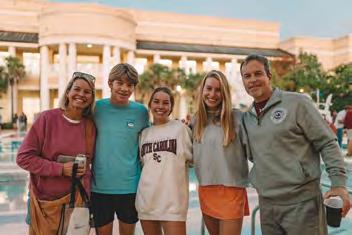

“I have seen the breadth of opportunities and resources our university offers its students,” said Cecelia Tatro, USC alumna and former intern for the Office of Parent and Family Programs. “It has given me a greater appreciation for the intentionality that our university staff pours into programming. It is a rewarding experience to share it with our Gamecock parents and families.”
The easiest way to connect with the Office of Parent and Family Programs’ resources is to visit the parent and families gateway at sc.edu/ parents. It consolidates and gives families information about what is most important, including all the other ways families can get connected.
One of those methods is the Gamecock Family Hub, a one-stop shop for campus resources, personalized information and relevant articles on topics from which families can benefit. The Hub features more timely information, and families can select how often they’d like to receive email newsletters that include announcements, reminders and updates.
By Tyler Sprague
The office also provides a mobile app on which users can access information on academic calendars, move-in procedures, financial aid and tuition payment, campus safety and security, maps and options to contact the office. Simply search “UofSC Parent & Family Programs” in a mobile app store or follow the guide at sc.edu/parents.

Those with specific questions or needs can always contact the Office of Parent and Family Programs through email at sparents@sc.edu or by phone at 803-777-3008 for individualized support. The assistance line allows parents to speak to an actual human to ask more complicated questions or navigate resources.

“Families just need to remember our number and email, as we can often get them to the right place or office the first time around,” said Leena Holt, director of Parent and Family Programs.
Besides just sharing information, the Office of Parent and Family Programs provides a memorable experience through Family Weekend, a signature event that takes place over a weekend during the fall semester. For the occasion, students invite family members and parents to see campus and experience what it’s like to call Carolina home. In addition to reuniting with their students, families can connect with others who also have loved ones attending the university.
This upcoming Family Weekend will be held from Sept. 22–23, 2023, featuring signature events such as the president’s meet-and-greet, Rock the Roost with the Reggie Sullivan Band, and the family tailgate party on Saturday before kickoff for the Family Weekend football game against Mississippi State.
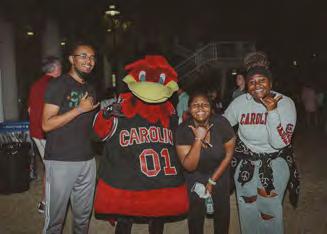
“My favorite parts of Family Weekend are the events tailored for family bonding,” Tatro said. “The family tailgate party prior to the football game on that Saturday is a great time for students to share their love for Gamecock football with their families. Families can feel the energy and excitement of a Saturday in Columbia, South Carolina. There is food, music and space to enjoy the time together. It is a truly special day when a parent gets to experience their first ‘Sandstorm’ with their student.”
Online registration for Family Weekend 2023 will open at 10 a.m. on July 11 and close at 4 p.m. on Sept. 1.
The Office of Parent and Family Programs has many opportunities for students and families to truly take advantage of their time here at USC in a stress-free way. Parents and students can find all these services and more through the gateway at sc.edu/parents or on the Parent & Family Programs app.





AT THE CENTER OF CAMPUS, located on Greene Street between Sumter and Bull streets, stands the Russell House University Union (RHUU), often lovingly referred to by students simply as “Russell.” Russell House serves as the beating heart of the Carolina campus, constantly filled with students looking for food, friends, events and more.
One of the main reasons to visit Russell House is to grab a bite to eat. With a variety of dining options from exclusive restaurants with international dishes and all-you-care-to-eat kitchens to popular chains such as Chick-fil-A, Panera and Panda Express, there’s something for everyone to enjoy.
Russell House has renovated and added several brand-new dining options over the past year. One of the additions was the new and improved Food Lab featuring a rotating restaurant system. Every few weeks, FoodLab is home to a new restaurant. Featured restaurants have included Mr. Beast Burger, Pardon My Cheesesteaks, and Buddy V’s Cake Slice. Through their Local Restaurant Row program, FoodLab has even featured local Columbia restaurants such as Paella South, Size Matters BBQ Bus and Cafe Strudel. All dining options offer both meal swipe and debit/credit card payment options.
Students can find various services and resources throughout the union besides food. Russell House’s basement includes a variety of resources, including Student Postal Services in the basement for package pick-up and U.S. passport applications, the CarolinaCard office, printing services and an event space, Russell Underground.
Russell Underground is fully equipped with high-quality audio and live-streaming capabilities, making it the perfect multipurpose venue for socials and events. Student organizations, university departments and other groups can reserve Russell Underground, so something is always happening.
“(Students) can program anything they want in this space. One night we can do a karaoke party, one night we can do a dance party, one night we can do a formal spoken word event,” Associate Director of Russell House Ryan Gross said.
The ground floor of Russell House is home to the Barnes & Noble USC bookstore, lounge areas and several dining options. The second floor offers more dining options, Russell House ballrooms and meeting spaces, study areas, Russell House Theater, a campus branch

The Leadership and Service Center helps students gain experience with leadership development, civic engagement, community service and getting involved in student organizations. Walking in and speaking with a student leader about these options is easy!
“My favorite part about the center is my coworkers. And we really focus on leadership positions, and we offer consultations,” Leadership and Service Center student ambassador Katie Owens said.

More information about the Leadership and Service Center can be found on page 16.


The third floor includes a large lounge area, additional meeting rooms, study spaces, the Carolina Styles Hair Salon, the Office of New Student Orientation, Garnet Media Group and Gamecock Entertainment. Outdoor spaces surrounding Russell House, such as the patio, Davis Field and Greene Street, are also available for reservation and to be used by the Carolina community.
Whether you’re looking for lunch or a space to hang out, Russell House is a great place to start.
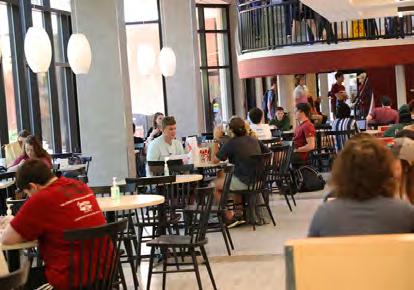 Photography by Mariah Perry
Photography by Mariah Perry
THE UNIVERSITY OF SOUTH CAROLINA has a population of religious or spiritual students who, coming into college, are leaving behind their safe spaces at home. The Office of Student Affairs and Academic Support assists these students in finding where they belong in USC’s faith-related community. There are a multitude of organizations available to students, including religious centers near campus, faith-based student clubs and religious affiliates that cater to the spiritual needs of students.
Lizzie Keegan, a campus staff leader of InterVarsity Christian Fellowship, has worked with USC students for eight years.
“College is such an important time to figure out who you are, what you believe and what you want out of life,” she said. Keegan says the university provides resources for students who want to continue their religious and spiritual involvement in college, offering many opportunities for young adults.
Still, they do not always take these chances.

“The resources are there — we have lots of campus faith groups, and the leaders of them are connected to each other, but I know that a lot of students don’t access spiritual help while in college,” Keegan said.
There are a plethora of religious centers close to campus that are easily accessible to students. Additionally, these places of worship are of different denominations, so individuals can go wherever they feel most comfortable. There are options for a variety of Christian denominations, as well as Jewish and Islamic places of worship.
“If students want to get involved in spiritual/ religious communities, they can find them pretty easily,” said Taylor Pierce, a student involved with various faith-based groups on campus. “There’s an almost overwhelming amount of religious organizations on campus, so it can be stressful, but there are lots of options.”
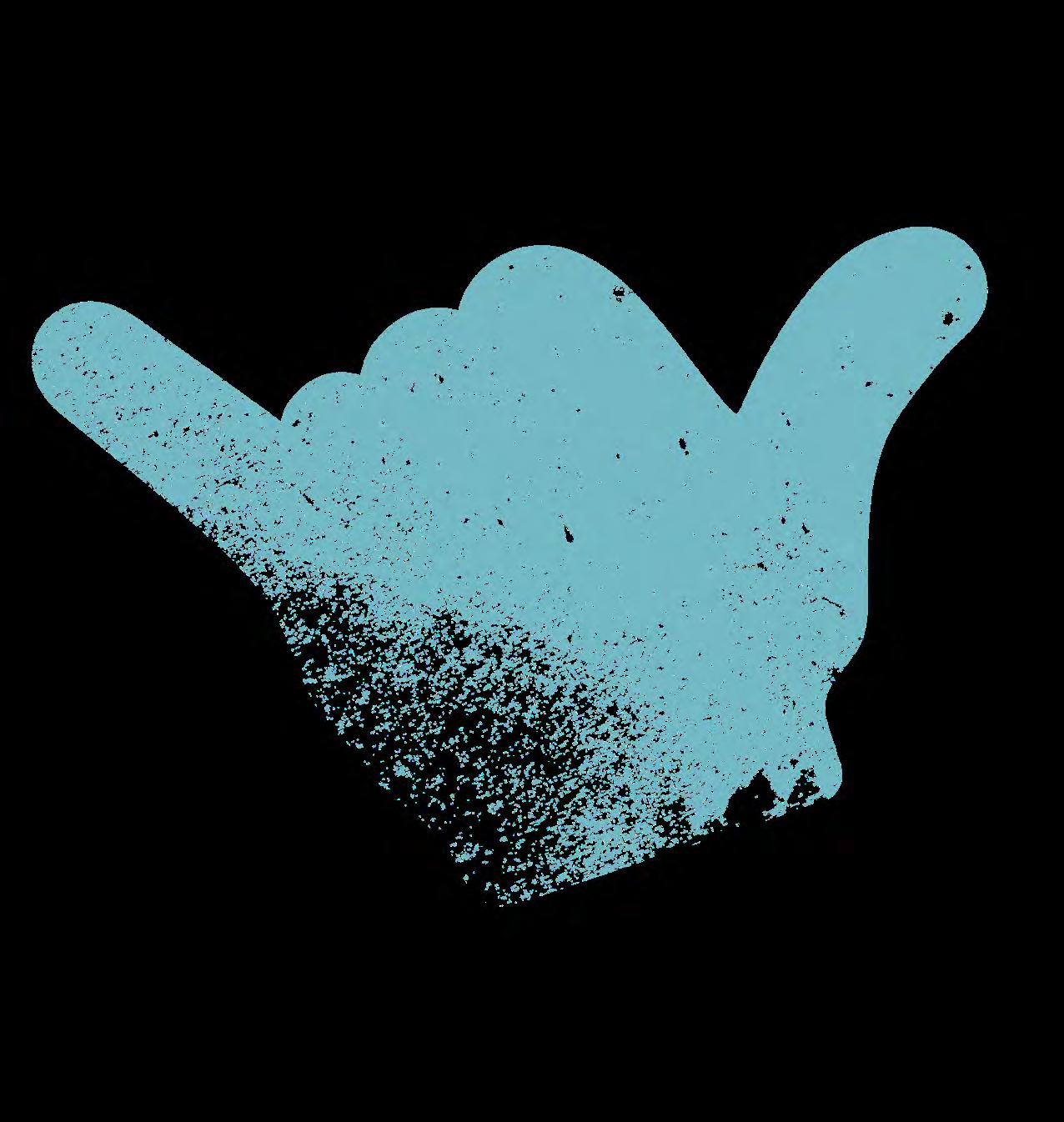 By Francesca Cumello
By Francesca Cumello
Religious affiliates are available on campus to support university students and to work with student groups by extending spiritual guidance to those who desire it. The goal is to “provide as much opportunity as possible for the articulation and expression of diverse, religious, and spiritual beliefs and practices,” according to university policy.
If an individual does not want to participate in a religious or spiritual organization but still wants to explore their faith on their own time, there are options. Prayer and/or meditation spaces are open in various buildings on campus, including Russell House, 300 Main Street, the Center for Health and Wellbeing C.A.L.M Oasis, the Close-Hipp Building, and Hamilton College.
For more information, visit the Spiritual and Religious Life section of the Student Affairs and Academic Support website.


STUDENTS INTERESTED IN being a representative for their fellow Gamecocks at the University of South Carolina should consider getting involved in Student Government, as the organization provides opportunities for student voices to be heard and ultimately improve life at UofSC.


Student Government consists of a variety of involvement opportunities including positions as executive officers and within the Executive Cabinet, Student Senate, Freshman Council, Constitutional Council, Elections Commission, Government Relations and as members of university committees.
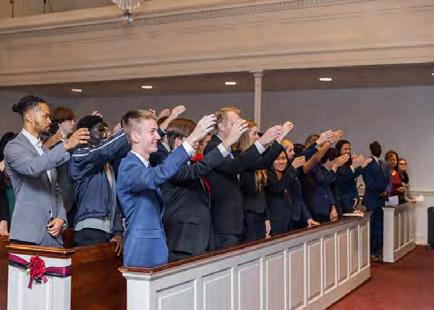
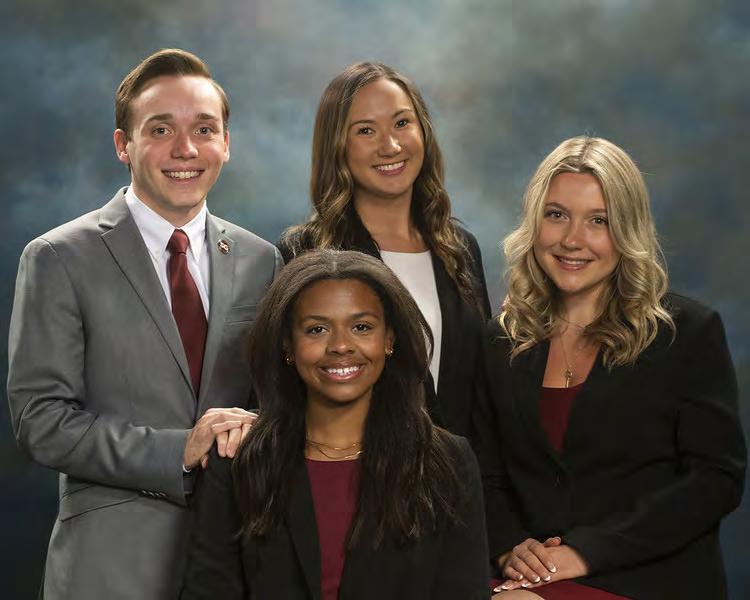
The Senate is made up of 50 senators corresponding to their respective colleges within the university, who are elected each year at the same time as the executive officers. The number of senators for each college is based on the number of students who are enrolled in the college. Senators draft, amend and vote on legislation that affects students and faculty on campus. The Senate has 10 committees, each with its own Speaker, which work to address student concerns about non-academic matters. Students are encouraged to voice their opinions by submitting suggestions or even applying to be in the Senate.

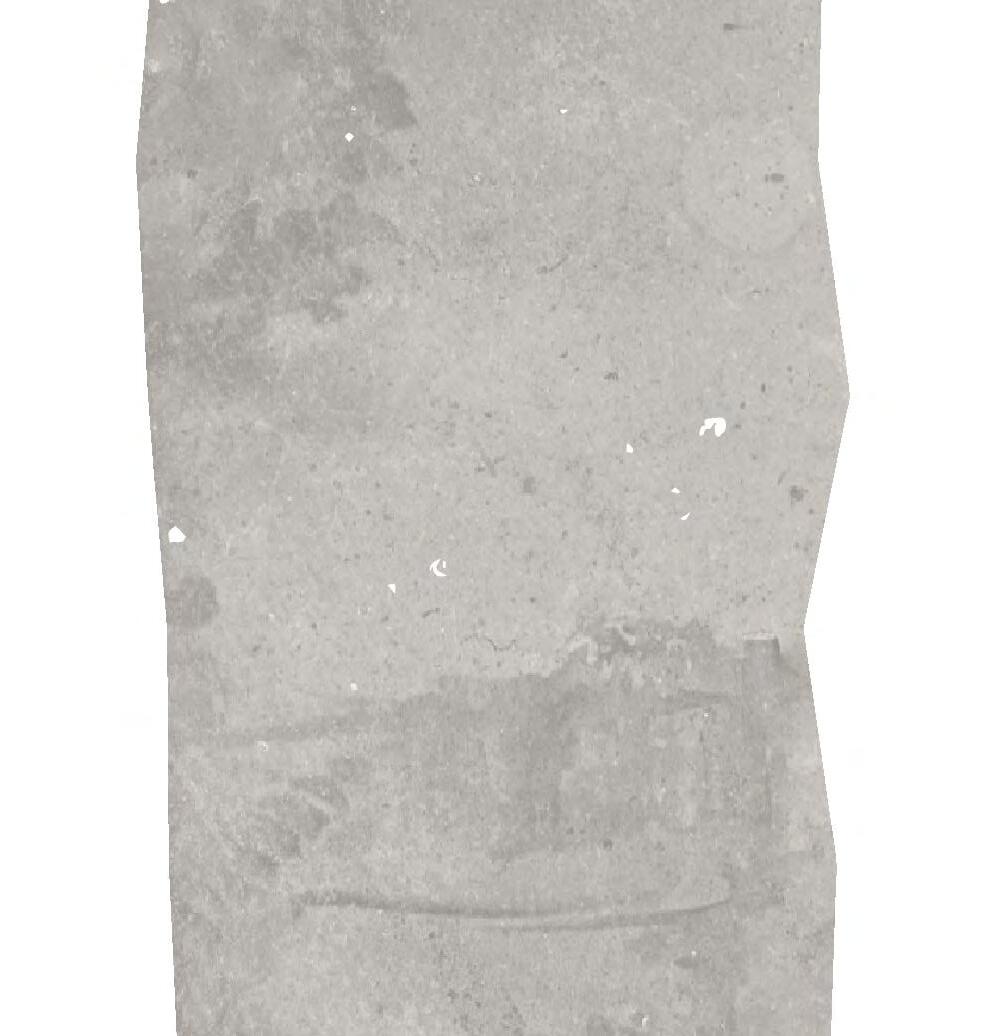
Freshman Council is exclusive to first-year students who want to represent their class through committees and make a change on campus. Students interested in joining Freshman Council are selected after a rigorous interview process from a diverse selection of candidates. Freshman Council members are assigned a mentor to help introduce them to the basics of student leadership. Students do not have to join the Freshman Council in order to be involved in Student Government.
well!”
One way that students can go about making changes on campus without joining Student Government is by connecting with other students on the specific issue they want to see fixed, according to Director of the Leadership and Service Center Ambra Hiott. Then, they can bring those concerns to a member of SG and potentially, depending on the issue, SG’s Government Relations team.
Government Relations consists of three lobbying councils. The Congressional Advisory Board meets with members of the South Carolina Congressional Delegation, the Legislative Action Network advocates for the
Columbia. Each lobbying council works to progress student and university interests.

Student Government also organizes initiatives that can be seen across campus and throughout the year, including a free airport shuttle service from campus to the Columbia Metropolitan Airport on breaks; Carolina Closet, which loans free professional or business clothing items to students; Stigma Free USC, an initiative that works to raise awareness of mental health concerns and encourage students to take care of themselves; and Swipe Out Hunger, which allows students to donate unused meal swipes to other students who are afflicted by food insecurity.
If students are interested in getting involved in Student Government, then they should visit the organization’s website on sc.edu.
THE STUDENT SUCCESS CENTER (SSC) offers a variety of academic support services to students on campus. If students need help with classes, organizational skills or managing money, the SSC provides free programs to help. Services offered by the SSC include course-specific support, money management consultations, population-specific support and more.
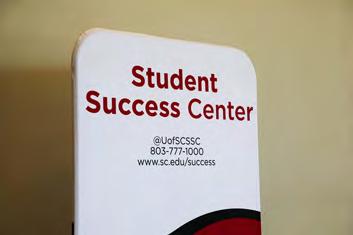
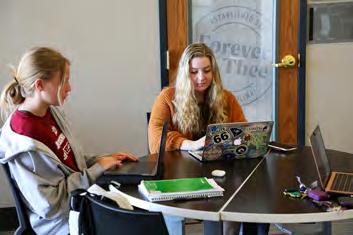
The SSC is most commonly used by students in need of course-specific assistance. Over 150 courses are supported by the SSC. The center has one-on-one tutoring sessions, drop-in tutoring hours and one-on-one writing assistance. Peer leaders or student employees lead all of these services. Peer leaders have already successfully taken the courses that they tutor.
“The peer-to-peer model is really impactful because it allows students to create multiple touch points throughout campus,” said Chris Gulino, the assistant director for coursespecific support. “They have their faculty member, which is a great resource, but they
also have a peer that they can relate to that was in their shoes in this class on this campus.”
The SSC uses supplemental instruction for historically difficult courses as additional course support. Supplemental instructors are students that have already achieved an A in the class and host study sessions for students in a particular class.
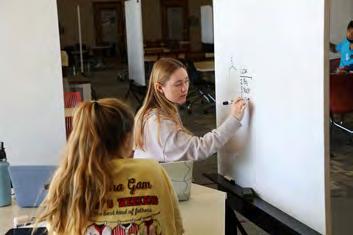

Junior Michael Pletniewski is a supplemental instructor for Accounting 225. He leads his sessions knowing that people learn in different ways and aims to utilize various learning methods in the sessions he runs.
“As an SI leader, I’ve learned that a lot of people have different study habits,” Pletniewski said. “I kind of implement different ones and am able to see that work firsthand with the students that come into my SI sessions.”
Non-course-specific assistance is also available at the SSC. If students struggle to manage their time, they can schedule a study skills consultation to work with a peer leader
By Alicia Caracciolo

and create a plan to help them succeed efficiently. Consultations focus on how to prepare for exams, succeed academically and avoid procrastination. Money management consultations are also available to students to help with basic budgeting, managing credit and planning for the future.
Gamecock School Supplies is another asset the SSC provides to students on campus, allowing students to pick up free supplies such as pencils and notebooks if needed.
The Student Success Center is a valuable resource for everyone on campus. Despite a student’s age or specific needs, the center is there to help.
“We always encourage students to come get help early and often. It’s not just for a student that may be struggling,” Gulino said. “Maybe a student just wants to learn a little bit more about the content or wants to make connections on campus. Meeting with one of our peers is a great way to do that.”
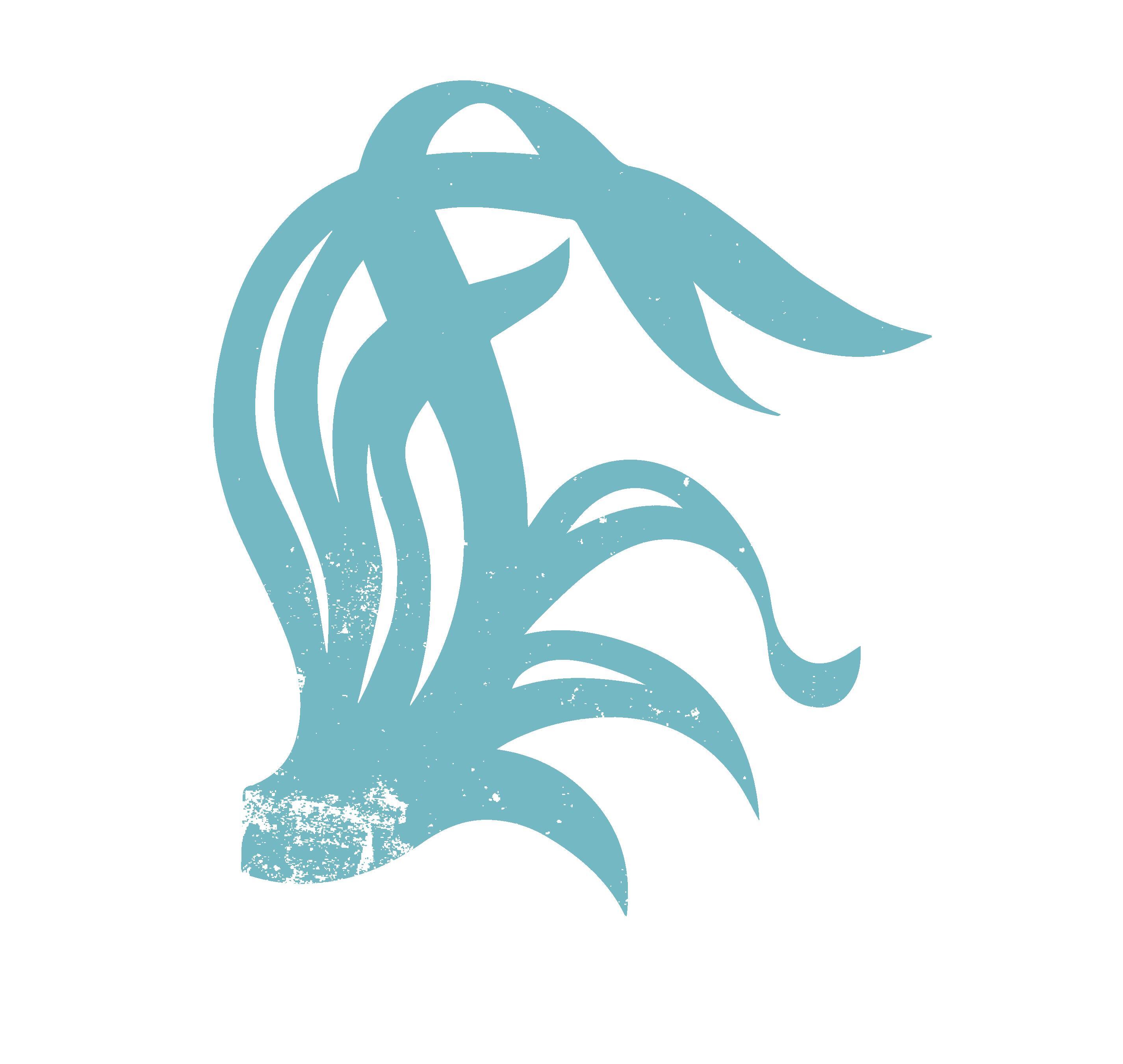
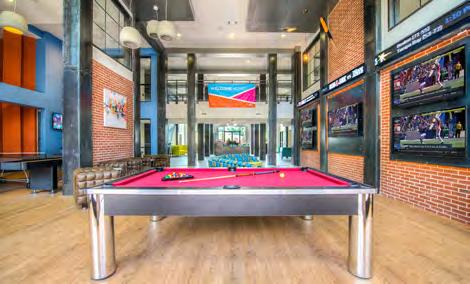
Clubhouse
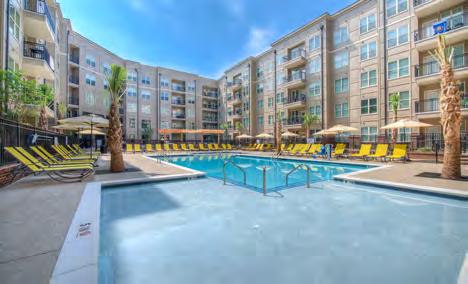

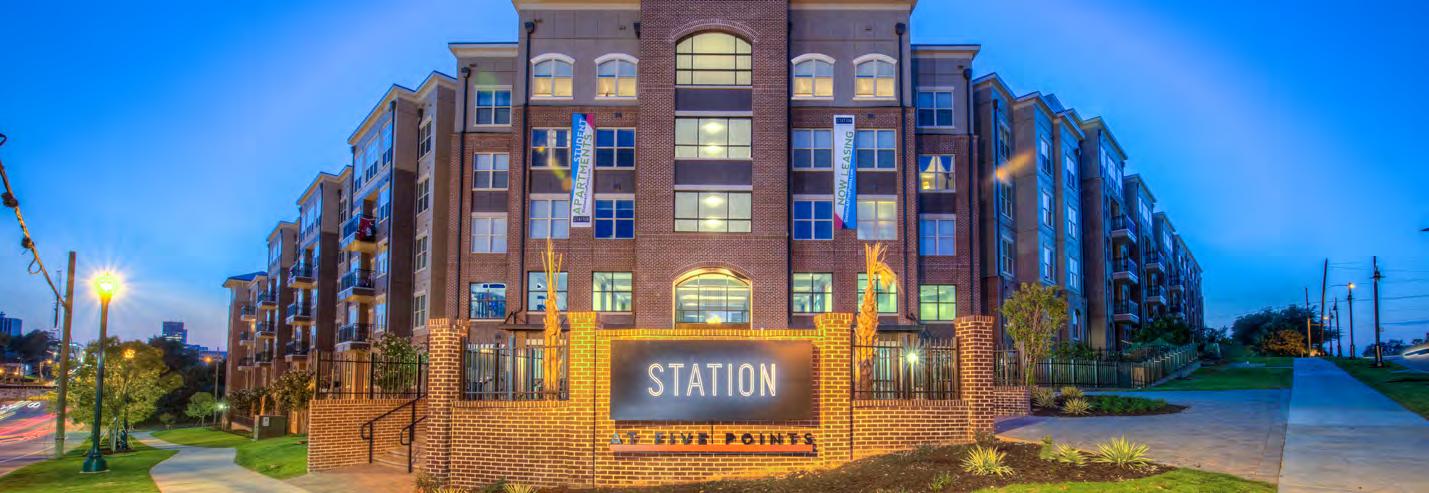
THE CAREER CENTER is the hub for all things career-related at USC. For undergraduate and graduate students, alumni, faculty and employers who need some guidance, the Career Center can lend a helping hand.
Students can reserve a time to meet with peers or the professional coaching staff to discuss topics like job searching strategies, how to format resumes and cover letters or how to network with employers. There are also opportunities for students to get free headshots and access to professional clothing. Director Helen Powers wants students to know that the Career Center is willing to help everyone with all questions and of any experience level.
“What we’re really trying to do is make sure that students understand there’s no reason you should know how to write a resume or would know what LinkedIn is,” Powers said. “For us, it’s ‘Come here, come learn. Let us help you walk through the journey.’”
Leah Letterhos is a USC student and Career Center peer educator. She describes her experience as incredibly rewarding and beneficial, especially compared to other jobs like retail.
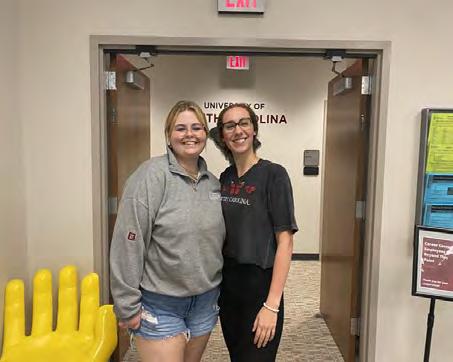
“[Working retail is] not going to help me with the skills that I’ve developed here,” Letterhos said, explaining how working as a peer educator has helped her develop important skills like public speaking and critical thinking.
The Career Center also works with employers to help students network and connect them with job opportunities. Employers can contact the Career Center for help recruiting USC students for internship opportunities and employment through things like job fairs and on-campus interviews.
By Sophia Wurster

Gamecock GradStats is a way for Career Center users to view the salaries, career paths and jobs acquired by over 175,000 USC graduates. With this, students can network with former Gamecocks, consider education pathways, look at top employers of USC graduates and more.

Powers said the new tool will “help students understand all the career possibilities that exist” and give them a greater insight into what they can do with their major.
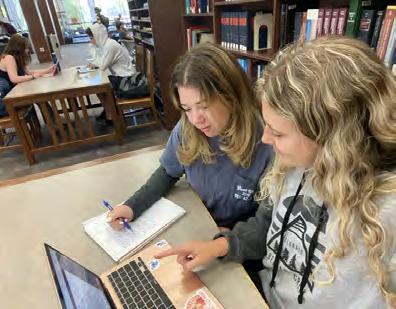

Alumni who are still exploring their options or considering changing career paths can use the Career Center for free for up to one year after graduation. That includes accessing assessment tools, coaching services, career fairs and on-campus interviews. After that year, services cost $40 per hour.
Faculty and staff members can use the Career Center to learn how to help students
by providing high-quality, effective letters of reference or employee referrals. Faculty can also have Career Center staff present to classes and groups to discuss all the services it offers.
Powers describes the environment of the Career Center as a caring place built to help students be the best they can be, and she encourages all students to see what it offers.
“I think people here genuinely want to help students,” Powers said. “And that’s why you should come to us because we actually care. We want you to be successful.”
To learn more about the Career Center, students can schedule an appointment with the Career Studio on Handshake or drop into the
Photography by Rachel JacksonEDUCATION, commonly known as SAPE, is “dedicated to promoting healthy, low-risk behavior and encouraging students to make responsible decisions when using alcohol and other drugs,” according to the office’s website.

The most common SAPE initiative that students interact with is AlcoholEdu. AlcoholEdu is an online education program all USC students must complete during their first semester. This online alcohol course measures students’ perceptions of alcohol use and abuse both before they arrive on campus and again after they’ve been on campus for several weeks.
SAPE also hosts tailgates before a few of the home football games in the fall, providing an alcohol-free alternative to pre-game festivities and offering water and sandwiches to students attending the game — whether
they are drinking or not. Nikki Prudé, SAPE’s the assistant director of outreach and communication, said the goal is for each student to feel comfortable in their habits regarding things like drinking alcohol.
SAPE also oversees Gamecock Recovery, a program that supports USC community members who are in recovery from substance use. The program offers recovery coaching, free coaching to students working to heal from substance abuse. This coaching spans all forms of recovery, from personal substance abuse to a student’s recovery from early substance exposure. These meetings cater to the student’s privacy and confidentiality concerns. According to Prudé, students do not have to turn on their microphones or cameras in the online meetings because they are designed to work at the student’s comfort level.
By Tyler Sprague & Will KellyStudents Taking Initiative and Responsibility (STIR) is a screening and intervention program that provides students with information on the negative impacts of substance use and ways to get support. Students can refer themselves or someone they know to this program, where the referred student will take a substance abuse assessment to provide deeper insight into their relationship with alcohol and other substances. After that, the student will attend three sessions with a STIR coach to offer insight as the student completes the program. STIR coaches are graduate students in the Social Work program at USC. They are trained to ensure students get the most out of the STIR program and guide them to identify high-risk behaviors in order to make healthy, responsible decisions instead.
SAPE’s office is located on the third floor of the Wellness and Fitness Center. For more information, visit the office’s website on sc.edu.

 By Francesca Cumello
By Francesca Cumello

natural landscape of the island, among other

“It was truly an experience I will never forget,” Lukowiak said. “This, in turn, brought our class very close together. It is so nice to run into my classmates on campus and have a friendly face with this unique experience bonding us
These positive peer relationships foster a sense of belonging, which is integral to a young adult in an unfamiliar — yet exciting — environment. Growing relationships with faculty, staff and fellow peers offers the opportunity to form a great connection to USC and each other. These bonds will grow and function as a primary support network throughout each student’s college career. During the class, students learn essential strategies to navigate the academic atmosphere of college. The program reinstates many best practices in freshman, concerning study skills, time management and prioritization. These skills can also be applied outside of USC in the real world as they begin participating in internships and, later, careers. Freshmen also get to know the University of South Carolina and gain a connection to its history and traditions.

Cami Reid, a staff member in the Honors College who teaches the class, said the U101 program is designed with every student in mind, promoting the idea that college can feel like home.
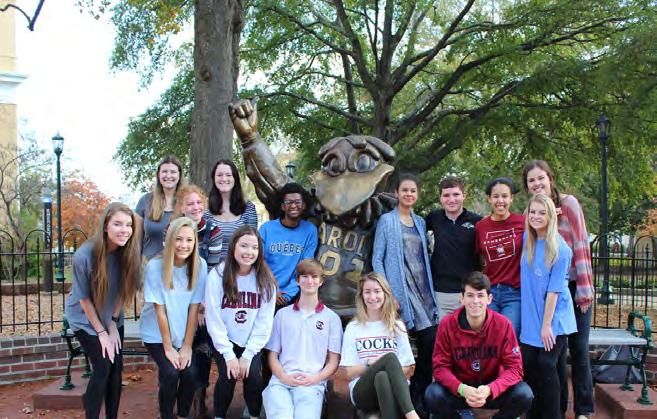
“The small class size, the incorporation of a peer leader, and the curriculum make it possible for U101 classes to meet students where they are and support them as individuals, not just students,” she said.
Reid truly believes in the program’s efficacy and has seen its results. She said the class cultivates “a safe space to learn, grow and feel seen and heard to kick off the transition to college and young adulthood,” in particular.
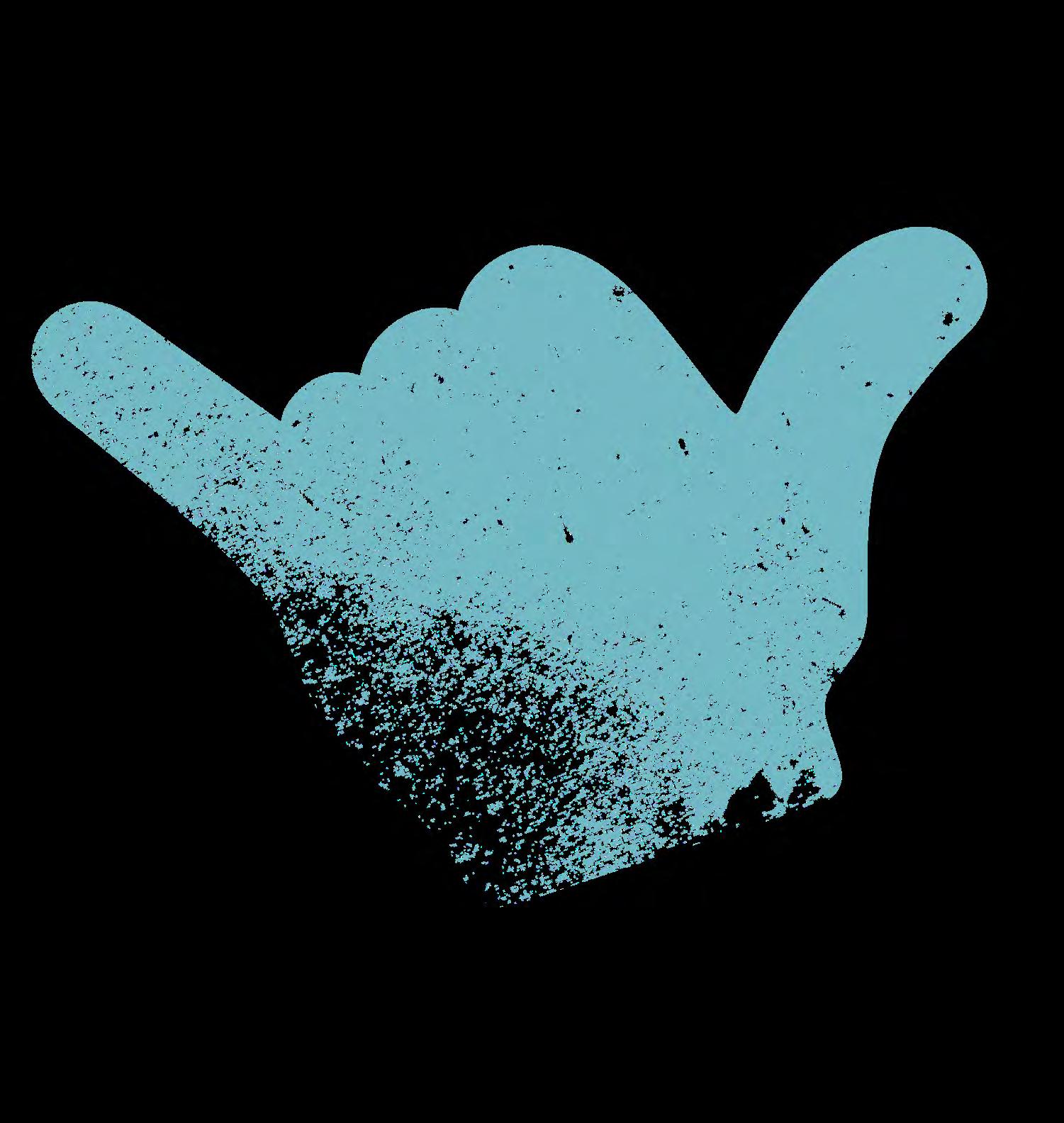
“I have seen students develop confidence in themselves, make friends, become leaders, explore their interests and find their place at USC,” Reid said. “Even better, I have seen this after the semester concludes.”
Incoming first-year students can enroll in University 101 while registering for classes before the start of the academic year, usually at orientation. Many sections suit students’ interests and fields of study, such as Business U101, Capstone U101, and Honors U101.
Photography provided by Emma Reabold
WITH MORE THAN 550 student organizations active on campus, USC has a club or group for basically any purpose or topic: certain careers, academics, sports, volunteering, games and many others. GarnetGate is the university’s online platform for getting involved outside the classroom and serves as a hub of information to help students find and join the organizations they’re looking for.
Users can use GarnetGate to see a full list of all student organizations or search for and filter organizations by name, keyword, subject, or category of organization. Logging in to the platform will allow you to see full details about each group, including the officers’ contact information, times of regular meetings, and important documents. GarnetGate also features information about campus events, including those that are open to the entire campus community, and allows users to RSVP
and track their attendance on the platform. Once a student officially joins an organization, they are listed on that group’s roster and their participation is formally noted by the university on the MyUofSCExperience transcript that lists extra-curricular activities.
Jamie Ayres, the Leadership and Service Center’s coordinator for leadership and student organizations, helps students and student leaders use GarnetGate effectively to find opportunities, plan events, communicate with members and share highlights and organizational news throughout the year. The LSC also hosts monthly workshops during the academic year to help student leaders with running their organizations.
“These workshops are really casual conversations about topics that student organization leaders and members are curious
By Katryn Westabout,” Ayres said. “These topics could include event planning, time management, goal setting, self-care, and transitioning roles to the next group of leaders.”
On the off chance that a certain club or organization doesn’t yet exist on USC’s campus, the Leadership and Service Center has a process for creating a new one. Founding members just need support from seven other members to begin the process.

“If you look for things you have an interest in, you’ll find opportunities that speak to your passions and interests,” Ayres said. “Start with one or two organizations, get a feel for those, and see what the time commitment is. And, of course, if you don’t find what you’re looking for, come see me, and we can talk about how to create it.”



TRIO IS A FEDERAL PROGRAM designed to aid first-generation and low-income students. While in high school, TRIO students are exposed to college and higher education programs that help acclimate them to a college environment. TRIO programs give students “the personal attention, planning and information to manage their financial constraints, strengthen their academic skills, adjust to the campus environment and set goals that lead to graduation and responsible participation in society,” according to TRIO’s page on the university website.
TRIO’s primary goals are to give high school students as much information as possible about college and build their academic skills to help them transition more successfully. TRIO offers college tours, leadership training, goal
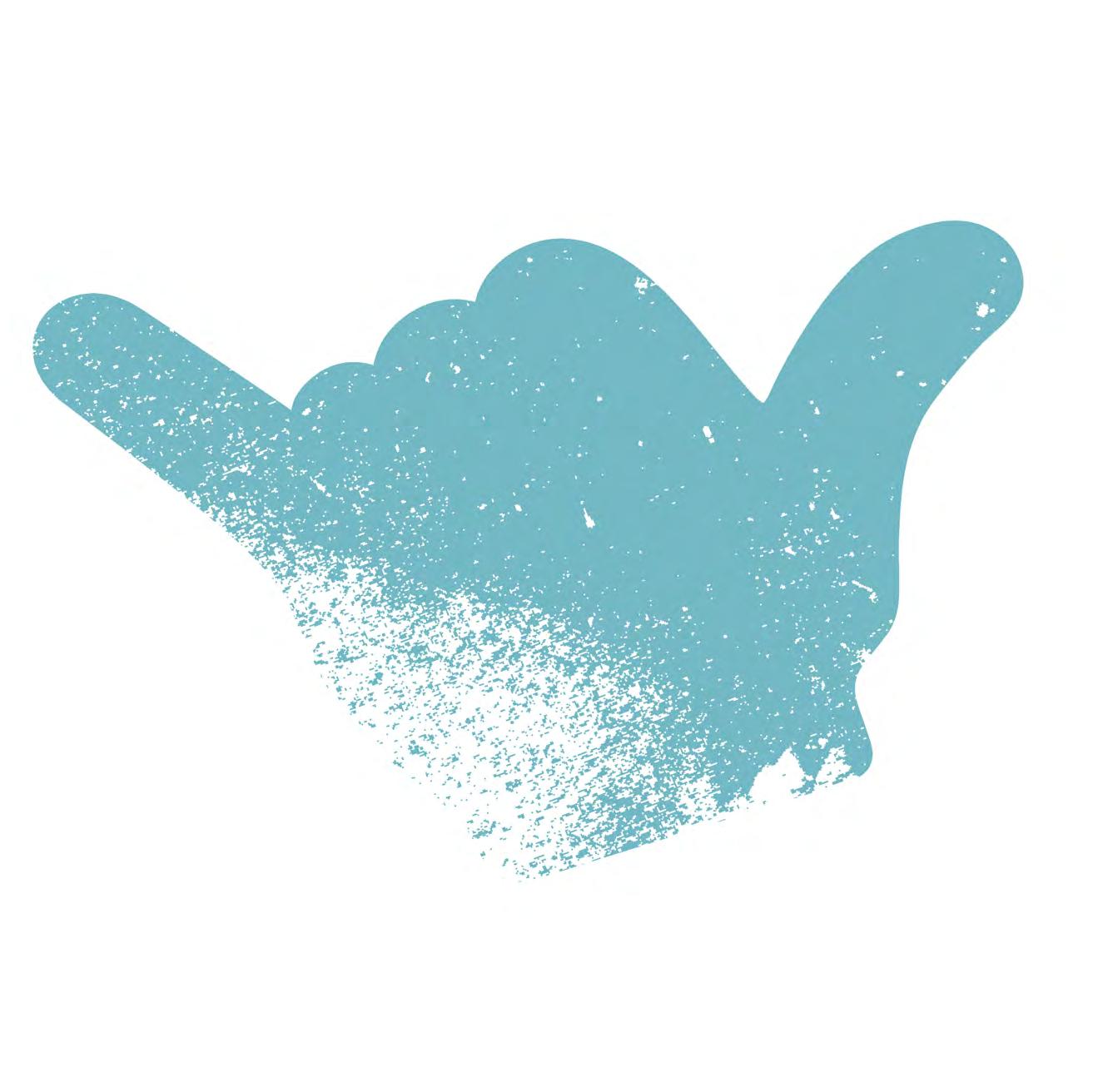
There are four programs TRIO offers to younger students and college students: Educational Talent Search (ETS), Upward Bound, Opportunity Scholars (OSP) and the Ronald E. McNair Program.

Education Talent Search encourages middle and high school students to consider college. Upward Bound is a pre-college program providing information and opportunities to TRIO-eligible high school students in Richland County.
At USC, the Opportunity Scholars Program (OSP) supports South Carolina residents who are federal Pell Grant-eligible, first-generation students. OSP offers smaller freshman courses taught by a team of instructors prepared to meet students’ needs and concerns. Support includes tutoring assistance, academic advising, guidance on undergraduate research, study
abroad opportunities, mentoring, workshops and cultural enrichment opportunities, according to TRIO’s website.



“I love it. We are called a family. There are a lot of events we go to, and all of the people in it are in the same situation as you,” OSP participant Madison Bishop said. “We are all first-generation and learn things by ourselves because our family members have not done it.”
Althea Counts, the director of the TRIO program at USC, said she wants students to have a “global experience” in college.
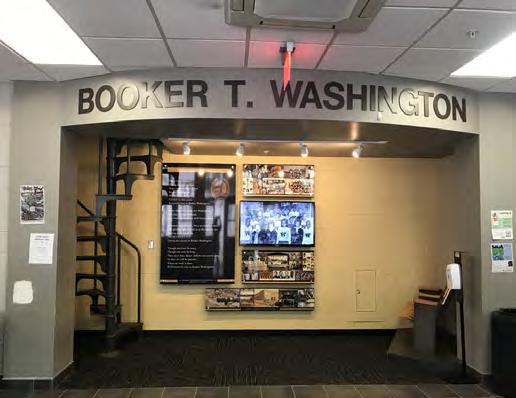
“We were able to get our own in-house study abroad experience for our Opportunity Scholars,” Counts said of OSP’s eight-day study trip to Dublin, Ireland.
The Ronald McNair program helps eligible undergraduates in pursuit of a graduate degree. The program offers faculty mentoring, research experiences, and other academic opportunities, so the number of first-generation and lowincome Ph.D. recipients will increase. Students enter the program in the spring, complete research in the summer, and then go on to finish the requirements for graduate school by taking an online course.
USC has been sponsoring TRIO Programs for over 50 years, lending the support of the university in keeping the programs active and helping first-generation, low-income students. The College Student Programs Office is located at 1400 Wheat St. For more information about TRIO, visit https://sc.edu/about/offices_ and_divisions/trio_programs.
Photography by Kaylin Daniels


THE STUDENT DISABILITY RESOURCE CENTER, or SDRC, is tasked with making sure all students with disabilities receive the accommodations necessary for them to excel during their time at Carolina. The center serves as a mediator between faculty, staff and the students it represents. The Student Disability Resource Center can advise you on classroom accommodations, Student Success Center referrals or serve as a liaison with South Carolina Vocational Rehab Department or the Workforce Recruitment program. They also host small group activities, including but not limited to art expressions, career planning sessions and discussions about transitions to college.
Examples of accommodations that could be provided are alternative testing, reduced course
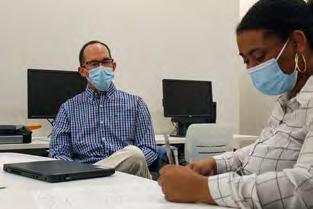 By Lauren Russo
By Lauren Russo
load, alternative format textbooks, note takers, sign language interpreter, real-time captioning, early class registration, preferential seating and approval for eating/drinking in a classroom or a wheelchair desk. Any student can complete registration at any time online, and the entire application process can take a few weeks to be
To receive the proper accommodations, students must register with the Student Disability Resource Center. The first step is to complete the application found on the Student Disability Resource Center website. Next is to gather the necessary documentation, then schedule and attend your assigned coordinator’s registration meeting. During this meeting, your coordinator will let you know what accommodations you have been approved for. The final step is to utilize your accommodations by sending out notification letters to each professor every semester you wish to receive your accommodations.
Sophomore Paige Tucci has been registered with the Student Disability Resource Center since her freshman year.

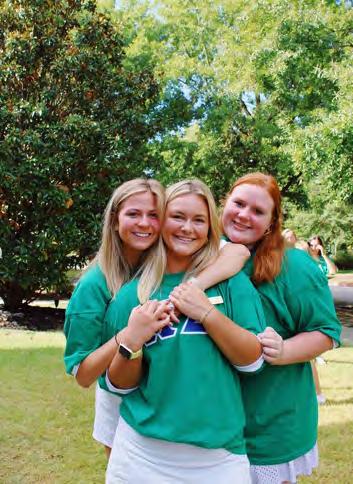
“It was one of the easiest processes,” Tucci said. “My family and I were very nervous about what the university could do for my accommodations, but my coordinator was extremely

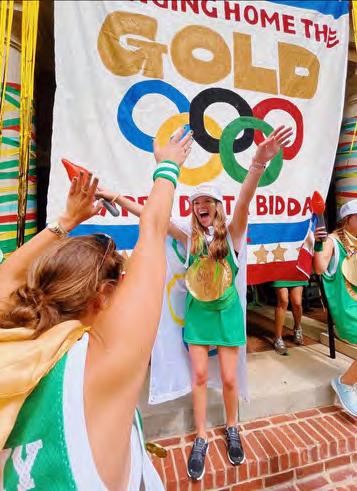
understanding and reassured me that my college experience will not be negatively impacted. Anytime I have a question, my coordinator is quick to respond and has also been very helpful as I prepare to go abroad this summer.”
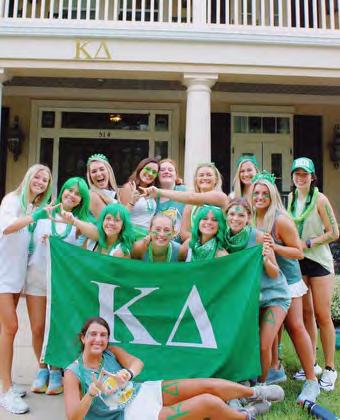

If you have a condition that is temporary but may still impact your ability to perform well in classes and need accommodations, the Student Disability Resource Center can help with that, too. There is a separate coordinator for temporary conditions and injuries that can start helping you with different accommodations right away. The first step to receive your temporary accommodations is to submit a temporary condition or injury application. This application should include documentation from a qualified medical professional about the nature of your injury and how long you will need assistance. Because this process needs to be expedited and documentation may take time to be available, you should still submit your application and email your professors to let them know you have started the process to receive temporary accommodations.
Faculty, staff, parents and other students can also submit a student referral form to help SDRC connect with students who could use their assistance.
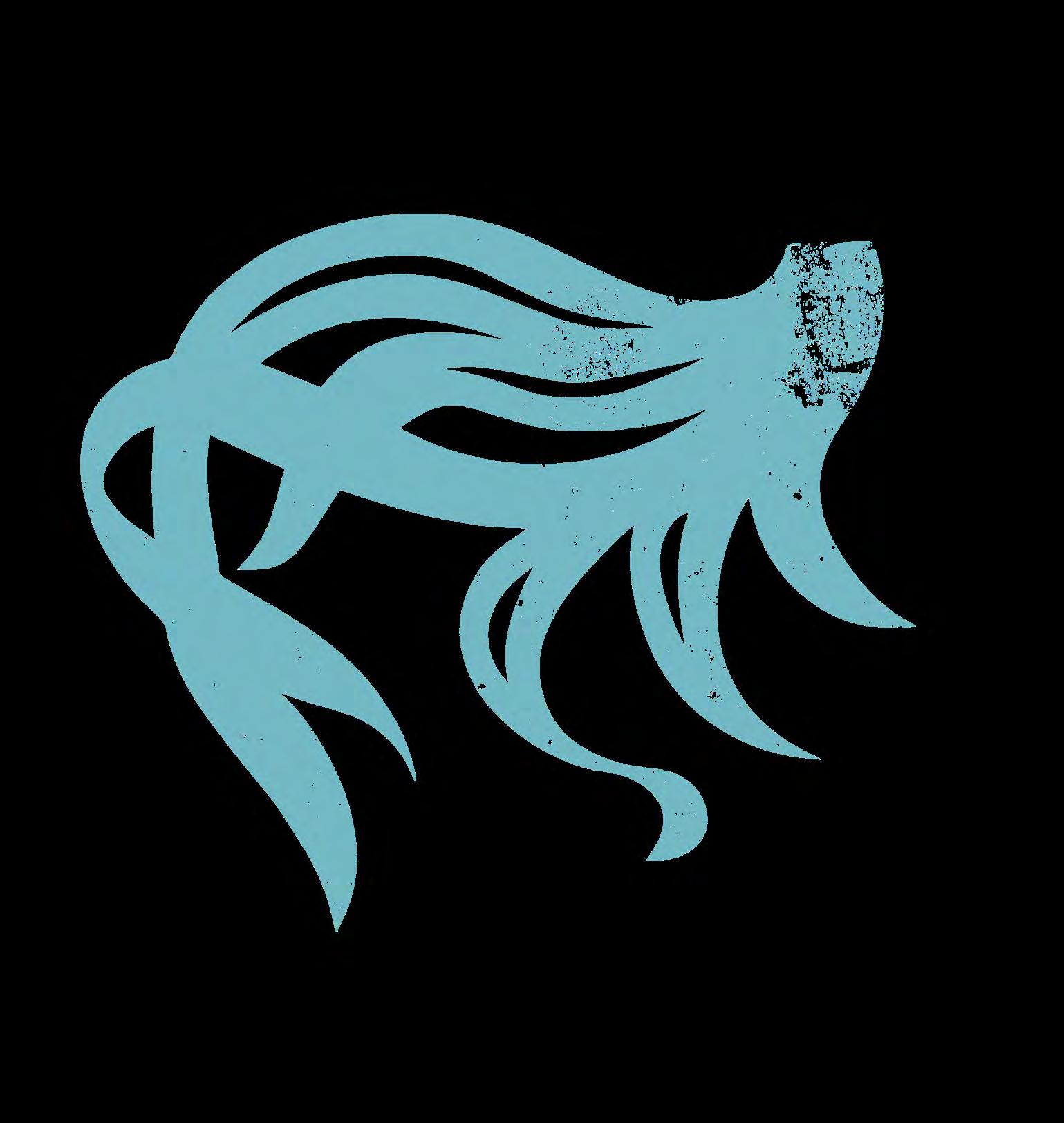
The Student Disability Resource Center is located at 1705 College Street in Close-Hipp Suite 102. They can be contacted by phone at 803-777-6142 or by email at sadrc@mailbox.sc.edu.

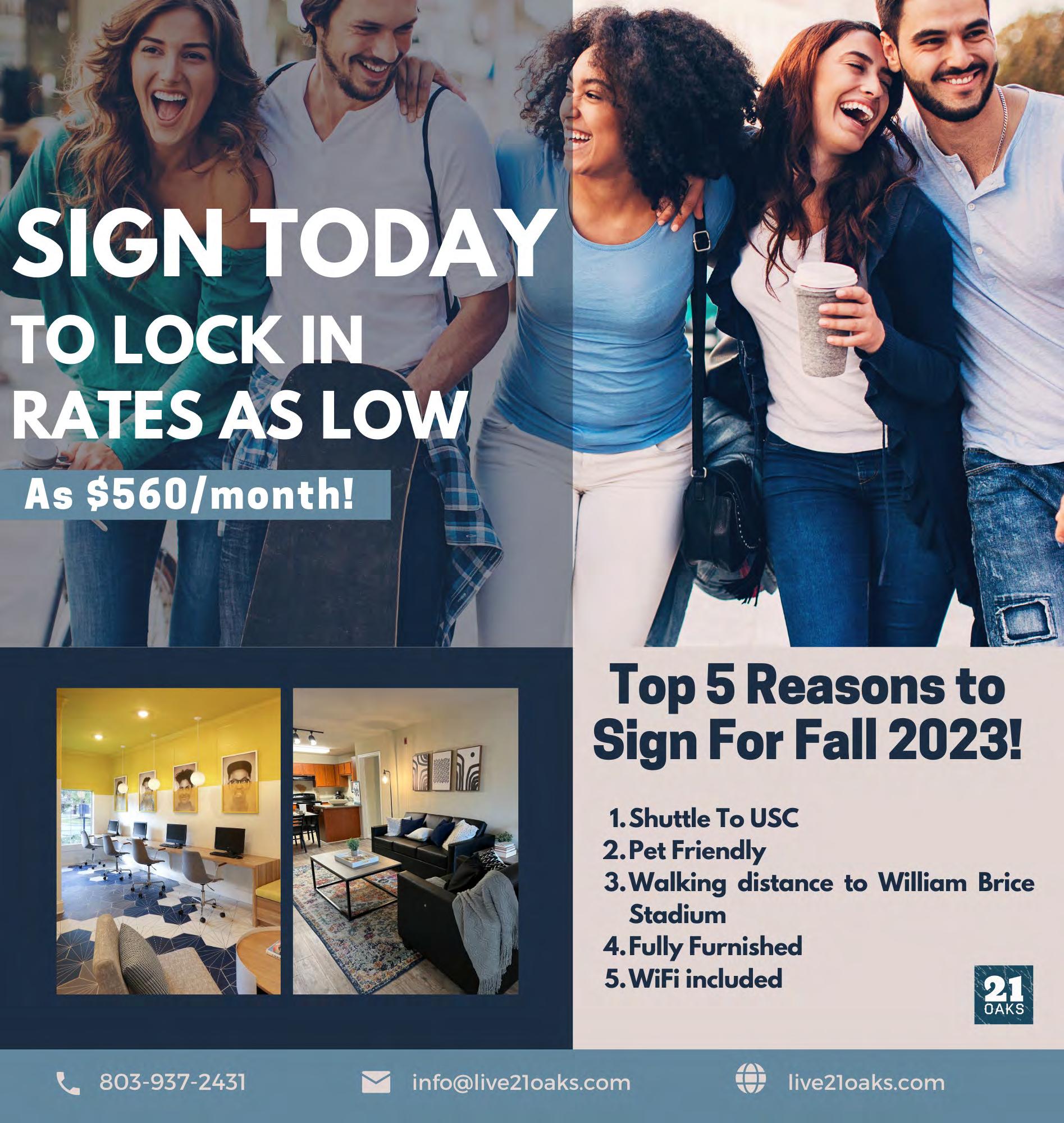



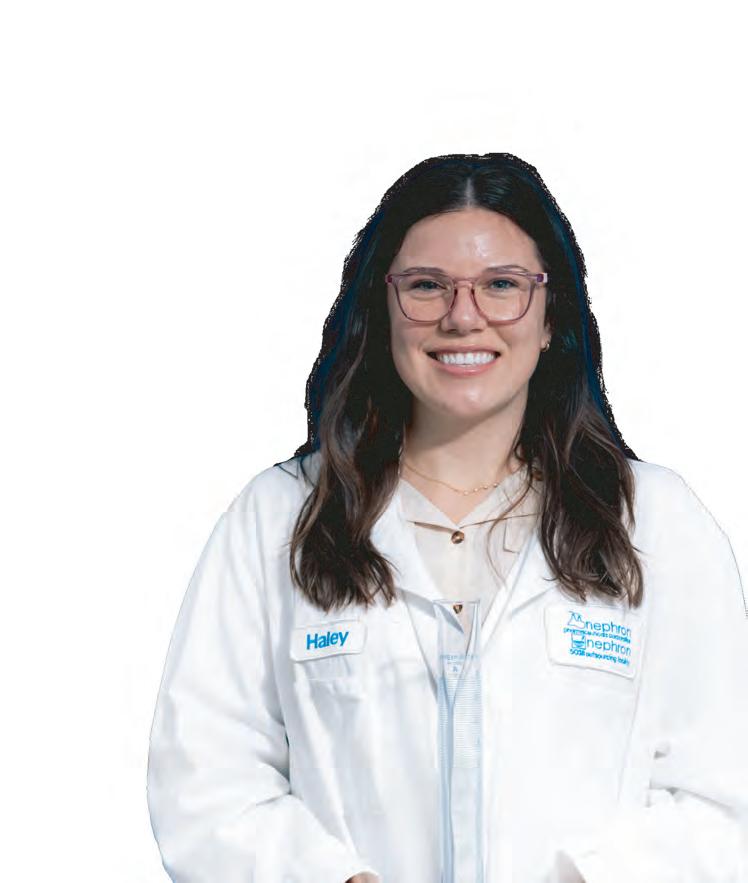
Shop our large selection of rental and used textbooks. Order course materials online, pick them up in store.
We work with your Professors to guarantee you have the right book for each class.
Bring your schedule to the bookstore to purchase your required materials, or shop online and enter your course information.
For more information on textbooks & course materials, plus access to exclusive discounts, visit shopgamecocks.com
